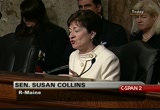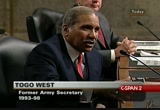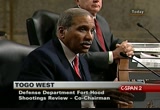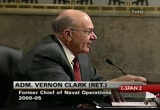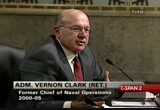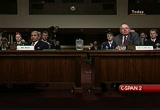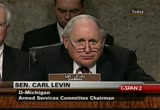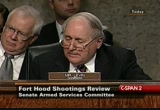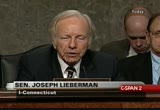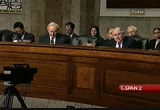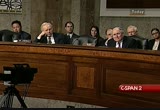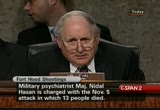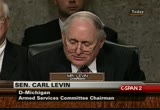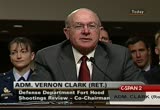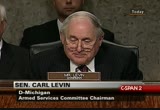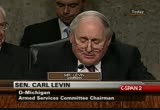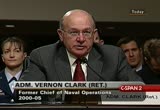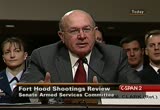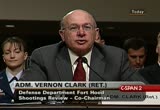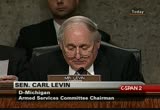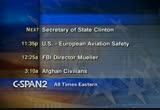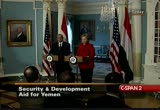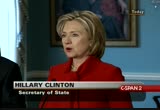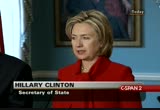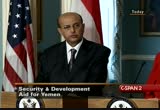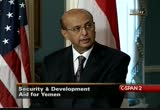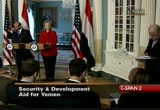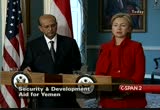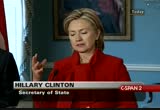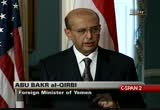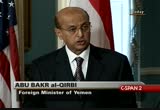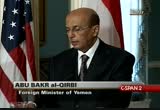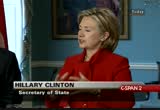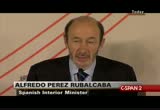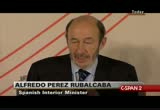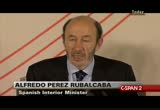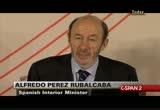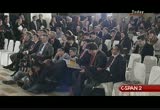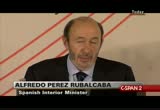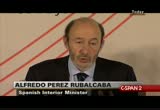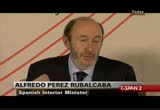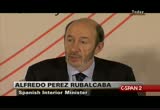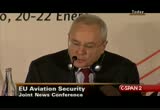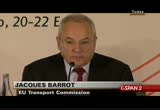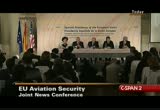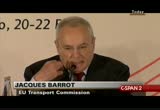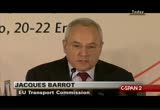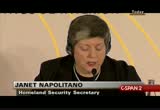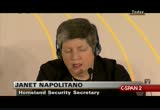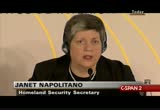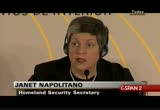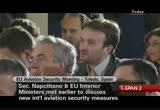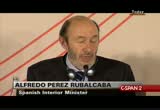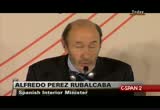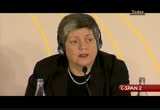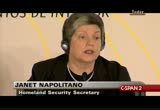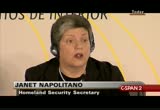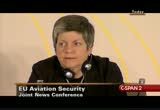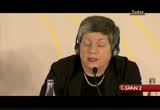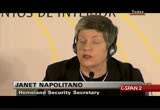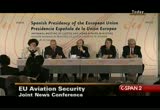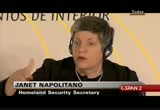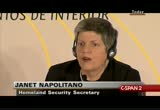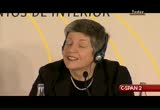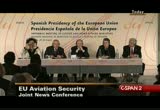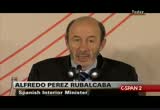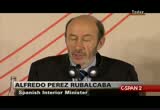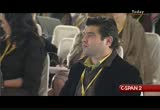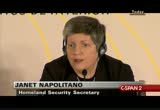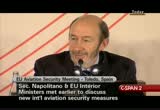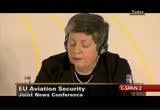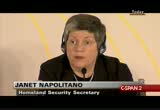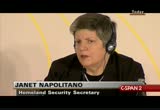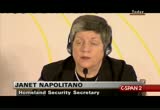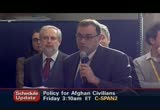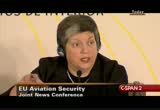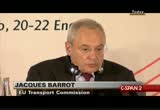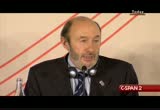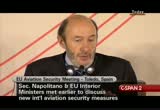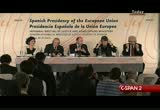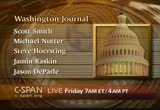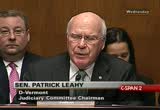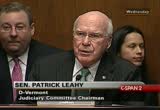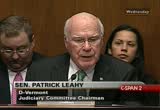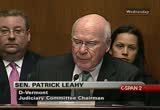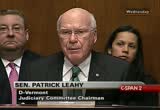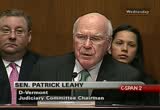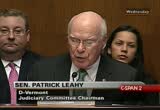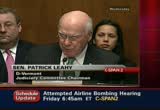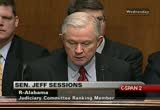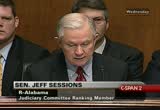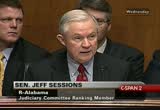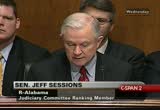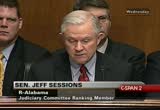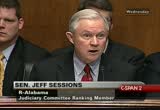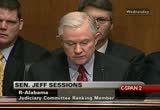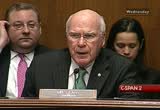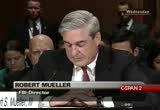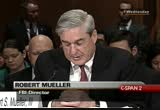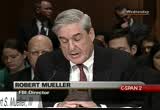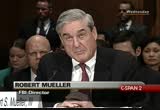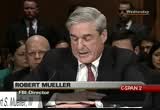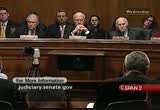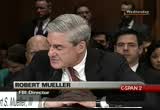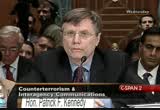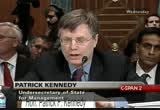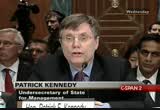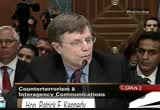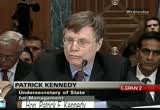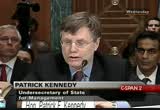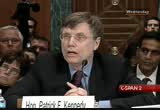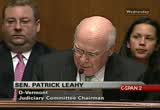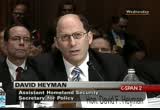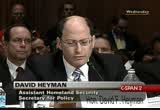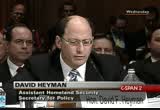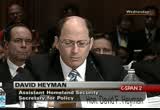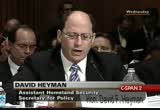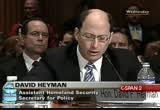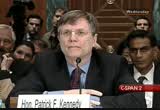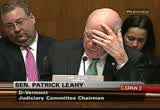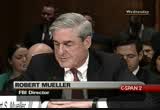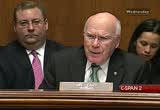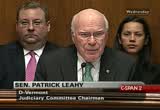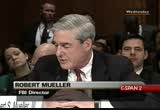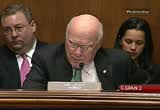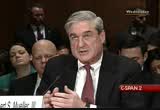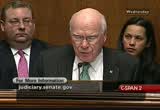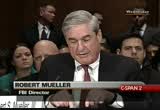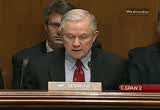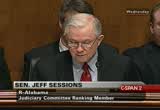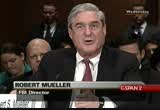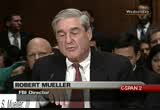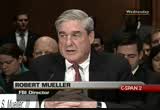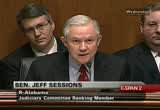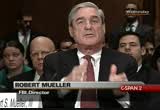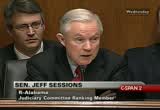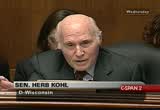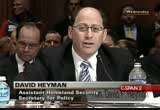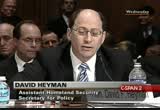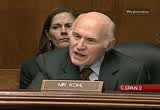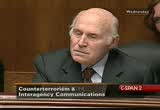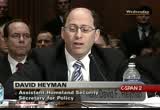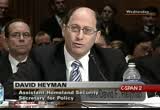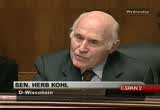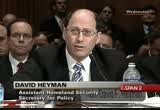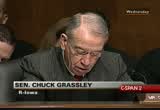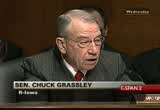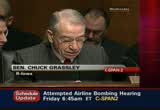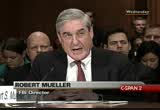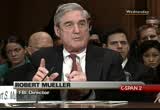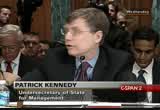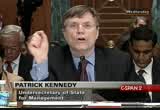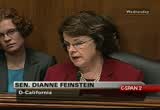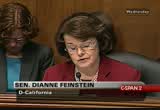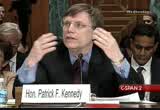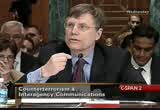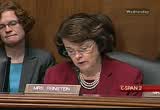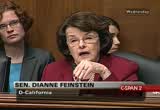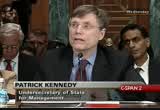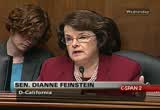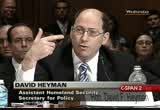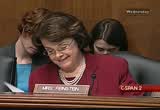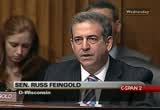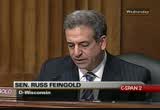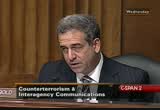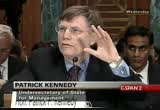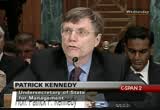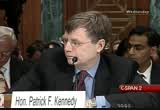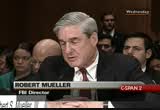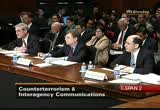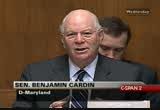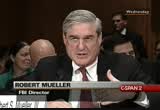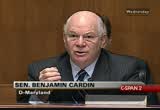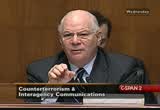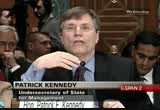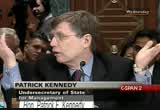tv Capital News Today CSPAN January 21, 2010 11:00pm-2:00am EST
11:00 pm
extremely important priorities for us. but they are different in their nature and the threat from islamic extremist. so i'd ask you to comment particularly on whether we should have specific training to recognize the signs of radicalization. mr. secretary and admiral clark. well, it's almost impossible to have a comment senator. i was a powerful statement along with senator lieberman's statement. and you put me ligaments under the gun by pointing out that's what we did in the army when that occurred here and i won't spend time on the distinctions. i mean, he is a white supremacist carries no overtones of constitutional protections or any sort where religion is
11:01 pm
always -- i know i'm going to be accused of being pc here. so what. it's always an area where we have to go carefully. for example, religious extremism, violent aggressive extremism is a source of threat to our soldiers, sailors, marines, airmen, coast guard personnel, whatever the religious source. and we need to be careful and we try to be careful when we did this to make sure do we turn the military's attention to the person i was quoted earlier as having talked about the cold war. that was secretary gates. and what he was pointing out was something we said witches we have been focused on external threats. well now we have to look on the internal threat from within for one of our own. and as i said before, this is our one shot at it, admiral clark and i am and we want to make sure that we look at the
11:02 pm
indicators and religious extremism, whatever its source is an indicator. and are a whole bunch of things to look at. i think that prescription is right. the fact that as you both make it that it is the islamic religious extremism. i think that is a point worth making. i think the secretary everyone will hear it and they will react accordingly. but that becomes part of the history of this discussion. ..
11:03 pm
>> i -- to build upon my response to senator lieberman, i'm just going to give you burns view here. we talked about this a lot. how do we shake this? and we can shake this as -- and the report of full of reference to radical islamic fundamentalistic activity and behavior. some people would have read it one -- you know that was. going to be all about that. the secretary of defense clearly gave us another task. he gave us the task to deal with violence in the workplace across
11:04 pm
the board. and because he did, we made the decision that we were going to handle it the way we have presented it. but when questioned about it -- we frankly, senator, didn't know how people were going to be able to misread the reference to self-radicalization. we thought that was going to be pretty clear. maybe it wasn't clear enough. our focus then, and one of our primary recommendation is the guidance on these behaviors is inadequate. and the way you make it adequate is you decide what the red lines are going to be. you reform your people. you do everything that you know how to do. that's called training. to ensure that our people know how to respond. that's what those of us are the privilege to command are charged to do. we talk officership in the report and so forth. that's what leaders do. that is what is required. >> thank you.
11:05 pm
>> thank you, very much, senator collins. i was listening to senator lieberman and senator collins with the suggestion that there be, we address a specific threat since it obviously is a specific threat the. it is appropriate that our leaders be directs as to how to address that threat. just the way they were i guess in the '90s with the white supremacy. to make it clear and certain that it's not radical islamic extremism would be very essential, it seems to me, and wise that people who are
11:06 pm
involved in preparing that kind of instruction and include muslims. because obviously that would be important in terms of knowledge of the threat, but also important in terms of making it clear that this is not anti-muslim. 99% of muslims are not people who are engaging in these kind of activities. and to make it's clear it's not this kind of aftereffort. which i think is legitimate effort that senator lieberman and collins talk about. that is a legitimate effort to make it clear that it is not aimed at muslims, but aimed at violent islamic radical extremism. it's important that muslims be significantly involved in that direction. and i was wondering if senator lieberman or collins might want to comment on that suggestion. >> mr. chairman, i think that's
11:07 pm
an excellent suggestion. it would be a real omission as i here you talk if it wasn't talk if muslims weren't involved. one of the things that troubled me in this situation, and i suppose why we feel like we have to talk explicitly to one another about this threat, including muslim, to have in the conference muslim-americans. 99% plus are not extremist or terrorist. i worry as i look at this fact situation in hasan's case that part of the reason that commanders and other after the attacks at fort hood were spews out to the media the signs of the -- that showed that he was
11:08 pm
returning in anti-american that people didn't voice them because of political connectness. even more than political correctness, the sensitivity that we all have about religious discussions. the truth is, the best thing that can happen is to have a real open discussion about this. and of course for it to be a real discussion it's got to include muslims. muslim-americans. so i think your suggestion -- muslim-americans have been seeing, -- i don't know the facts about this. some of the things hasan was saying didn't reflect what they think. therefore, mr. chairman, i think your suggestion is really an excellent one. thank you. >> mr. chairman, if i could just
11:09 pm
respond as well. i too think that your suggestion is an excellent one. and it's very consistent with the approach that senator lieberman and i have have advocated on the homeland security committee. in fact, in our letter to the two secretary gates where we suggest more training, we point out that updating the approach would help to protect from suspicion the thousands of muslim-americans who are serving honorly in the u.s. military and help to maintain the bonds of trust among service members of all religions. and enhance understanding. so the steps that we have recommended would clearly benefit from the inclusion and active involvement of
11:10 pm
muslim-americans. that's what we intended. but i also think it has with thed for muslim-americans serving so that other service members have a better understanding of islam. and so i'm in complete accord with what you suggest. and i think that is along the lines of what we were proposing as well. i would ask that we share with our two distinguished witnesses today the recommendations that senator lieberman and i have made in our january 13 letter to secretary gates. because as you go forward with your work, it may be a value of to you as well. thank you. >> thank you, one the things that seemed to me to be appropriate. i don't know if you address it, but it's sort of along this line. our policies also should be very
11:11 pm
clear about why it is a -- unacceptable and unallowed and profited to have taunting and harassment of people because of their religious views. as according to the public record occurred in the hasan case. i don't know if that's true. and i don't know -- i can't comment on your annex. but it seems to me this is part in partial religious tolerance does not mean tolerance for violence and extremism. is doesn't mean that as i pointed out a few -- maybe an hour ago. that's not what we are tolerant of. what we are tolerant of is other people's religious views. as part of that, it has got to be importantly pointed out in the military that means we do
11:12 pm
not accept taunts, graffiti of rag heads or what have you about anyone's religious views. i don't know if that is part of your recommendation here that be clear as well in terms of guidance. it seems to me it's an important part. >> let me address it, it's very well covered in the profited behaviors and activities. >> you mean currently? >> currently. it's very well spelled out. i've spoken only to what is not in this document. what's in this document is 100% right. and it is the -- what we have said that document does not have to be regarding self-radicalizing behavior. mr. chairman, i want to appreciate the fact that you have collectively recognized the very effective and loyal service of thousands of muslims.
11:13 pm
somebody accuse me of being politically correct. the way you said it is exactly right. i appreciate it. >> one thing to make this even more complex. we talk about connecting the dots. we have to be a far better job of connect thing the dots. i believe this is the greatest failure that we have been discussing in various committees. there are counterdots that complicated work. including with major hasan. it's not just those dots which in my view would have made folks what his potential was. there's dot thes that go in the other direction. what his patients thought of him. which was very high. you got to throw those dots into the mix too for people who are going to be judging him.
11:14 pm
you have a record here of a number of his assessments. they were not just negative that should have been included in the record by the way. i happen to degree with you to -- totally. there's also some highly positive, not politically correct, positive assessment of his capability. i think it's important since we're trying to take a jr. -- general view of this while it's politically important to connect the dots that we also recognize in terms of the task in front of us that there are some dots that are going to be in the mix which make it very unclear as to what you do with the dots that seem to point in one direction. because there's dots that point in the other direction. even with him, they are not being focused on, obviously. but there are some counterindicators here which are fairly clear as well.
11:15 pm
finally, admiral, you talk about reducing -- eliminating i think is your word, the barriers. get rid of the barriers to information flow. i think generally you are right. there's barriers here which clearly should not be there. so i agree with your premise. are there any barriers that you'd want to maintain, either privacy barriers or barriers -- i think you talked about prior drug problem or adistribution problem. which have been over come. some of that has not passed along now. and if it's been over come, i think there's some instinct in commanders that we should let certain things not be passed along which would unfairly perhaps hurt somebody's career path if they've over come a problem. are there any barriers that you might want to keep? >> there may be. and if i was responsible for the
11:16 pm
policy review, i would then look at all of the potential courses of action, and i'll make that kind of determination. let me give you an example in which the manner that i might decide to handle the case that you've just suggested. as you correctly pointed out, by regulation there is some documentation that is not allowed to proceed from command to command. we could figure out how to get information. we do it in the intelligence world all the time. only certain people get to see that information. it'd be very possible to have information that might be vital to connecting the dots that are currently not passed. passed in a way the component if so the select group of people had access to the information.
11:17 pm
i believe that's inherit in achieving the correct balance. and not -- secretary wes and i would not want anything that's said here to imply in any way the balance between these issues isn't so. it is very, very important. you have addressed it correctly. this is a challenge. one the hallmarks of the united states military is we grow and develop people. i mean i've had dozens of these interviews with people, okay, you're getting a few job. this is turning over a new leaf. this is a time to go get it. we've seen people turn their lives around. this is one of the great things about our institution. so clearly these are issues that the policymakers have to come to grips with. our task was put the spotlight on policies, weaknesses, gaps, that's what we have tried to
11:18 pm
do. i do believe there may be places where barriers should be retained in some way. >> and maybe for some. >> for some purpose. >> maybe promotions or -- >> exactly. >> whether it's a security issue. >> exactly. but what i'm suggesting is that people who are responsible for these policy decisions know what the vital dots look like. they know where they come from. as i -- the report said and in my earlier testimony, the time has passed for us to be having the turf wars on who owns the information. >> i couldn't agree with you more. this is a major challenge for all of us in the senate and house and committee and being more importantly probably for the executive branch. senator lieberman, do you want to add anything? we thank you for all of the work you are doing not just here but on the homeland security. that committee is doing
11:19 pm
critically important work. we are now going to move to a closed session of the committee. we'll meet in room 222 in russell. our committee room. in accordance with restrictions placed on the access to the restricted annex, dance to be limited to senator and professional staff. we thank our witnesses not just for their work in this regard but for their life-long work at behalf of our nation. we will stand here. >> thank you, mr. chairman. >> thank you, joe. [inaudible conversations] >> togo west and vernon clark also testified before the service committee this week. you can watch this video at the c-span video library. c-spanvideo.org.
11:20 pm
11:21 pm
>> each year the washington center brings thousands of students to washington tos of or government first hand. they will discuss politics, government, and their future. sunday night on c-span. >> secretary of state hillary clinton and foreign minister of yemen met with the press. this is about 10 minutes. >> good afternoon. i am pleased to welcome the foreign minister to the state department today. we've had a very open and productive conversation about a number of important issues.
11:22 pm
our two nations are working together as partners to improve yemen's capacity to deliver vital services, control its borders, and conduct effective counterterrorist activities, improve services to the people of yemen. we face a common threat from those violent extremist who target civilians without mercy or remorse. al qaeda in the arabian peninsula has killed dozens of yemenis in recent years, including seven soldiers who died guarding the united states embassy during an attack by suicide bombers on september 17, 2008. we have seen al qaeda in the arabian peninsula kill tourist in yemen, yemeni security officers, and being involved in the training and equipping of the perpetrator on the attempted christmas day airline bomber.
11:23 pm
now, to combat this growing threat, the united states will intensify it's cooperation with yemen on both security and development. we will work with other partners and like-minded countries. yemen has demonstrated a willingness and a capacity to take action against al qaeda and other extremist groups. and the united states commends these actions. we also discussed how we could deal more effectively with the internal stresses inside yemen. these are matters for yemen to resolve through dialogue and political cooperation, but we aid long with others will stand ready to assist. we will gather in london next week to discuss these efforts at a conference called for this occasion. i am pleased to note that usaid recently signed a three-year umbrella assistance agreement with the government of yemen
11:24 pm
which we hope will amount to the deliver of $121 million in development and economic assistance to the country. however, the success of this investment depends upon yemen's ability to make the tough choices necessary to improve the capacity to govern, to reform its economy, and to protect human rights, to combat corruption, and create a better environment for business and investment. so again, let me thank the foreign minister for this visit, and to pledge our cooperation in the years ahead on behalf of yemen. >> thank you very much, madame secretary. thank you for the this opportunity to meet and address many of the challenges faced by yemen and how we can see that the relation between our two countries moves forward. i am very pleased and glad to say that with the new administration, we have seen a greater understanding to the
11:25 pm
challenges faced by yemen and the willingness to help yemen. and with president barack obama and your excel learn si, we will see a strong and united yemen. yemen has stressed a number of issues in this meeting. first of all, our commitment to continue the fight against terrorism and against radicalization. the other important challenge in the our part of the world, that our fight against terrorism has an important component to it, which is now clearly understood, and that is the development. and yemen has, in its development program over the last few years, had undertaken rather courageous decisions on reforms. and the lack of achievement is
11:26 pm
due to the fact that yemen did not have the resources to implement these reforms. i'm glad with this sort of support we are get thing from the united states, it will make it easier for us to move forward. we hope that the london conference will come to strengthen our capacities of implementing a lot of the reforms and achieving the economic growth. i am here again to stress that we will continue to work with the u.s. administration and with the partners on development, and will hope we will see further improvement of the relation between our two countries. >> thank you, sir. >> thank you very much. >> the first question from cnn, elise. >> thank you. a question for both of you about the upcoming immediating next week. madame secretary, you've said in recent weeks, the u.s. is eager to help yemen. but that there would be conditions or expectations
11:27 pm
placed on that. what kind of conditions and expectations are you looking for? and mr. minister, you've said today and in the past that yemen didn't have the resources that it needed to institute some of the reforms in the counterterrorism and development that it wanted to do. what makes you think that this time, you could be assured that the international community will help you implement and that you can count on this type of assistance? and i was wondering for both of you, if you had spoken about the fact that over the last few years, the u.s. has been concerned that some people on the fbi most wanted list have been in yemen and have not been apprehended. madame secretary, did you bring this up? and mr. minister, did you give assurances that all wanted terrorist suspects would be taken care of? thank you. >> well, elise, let me start by saying as the minister said, we have worked hard this past year to develop a constructive and
11:28 pm
positive relationship with yemen around both security and development. i can't speak to what has gone on prior to that, but we believe strongly that we've seen from the government of yemen a very active and effective commitment to combat the radical extremist, particularly al qaeda, in the a arabian peninsula in the last month. that is from our perspective a very positive sign that we are building on. there is also an awareness on the part of both the united states and yemen that our relationship cannot be just about the terrorists. as critical as that is it our security and our future and to the stability and unitety of yemen, the best way to really get at some of these underlying problems that exist is through an effective development
11:29 pm
strategy. president salih has made clear the 10-point economic plan. and we have made clear that we have the expectations. we have the right to work with the government of yemen as we do provide development. because we want it to go for the benefit of the people of yes pen within we want to see results in the ground. we're seeing results in the counterterrorism and we want to see similar results when it comes to development. but i believe that the foreign minister and other high officials in yemen understand that. they are commitmented to this new course. we want to assist them in being successful. >> thanks. let me answer your first part of the question. we believe that donors who have committed billions of dollars in 2006 in london donors conference have realized now that the delay is implementation -- and the
11:30 pm
delay in implementation is not fault of the yemeni government. it is actually the mechanickism by which different funds in the gcc countries and others dispense these funds. so it is a bureaucratic problem as well as one of the technical aspects to it. the lost time over the last three years, i think, got yemen to what it is now. the economic situation that we are facing. so i hope that london conference will address these issues in order to avoid repeating this mistake that happened in the past. we feel the donors realize the importance of the stability of yemen and it's unity. and that is what we bank on in london conference this time is that there will be a serious look at the needs of yemen for development and it will be addressed. and then we can look at the processes after that. regarding the terrorists who are
11:31 pm
in yemen, i can assure you that those who are in the hands of the government are apprehended, and some of them have been prosecuted. of course there are some that are at large, and these are being pursued by the security forces. [inaudible] >> thank you. >> yes, sir. >> you called it a common threat. what are the exact step that you require the yemen government to take to make sure that the threat is not really threatening them and us and here? mr. foreign minister, it seems that there is a very high sensitivity talk about the foot soldiers of america and yemen. what do you really need from washington? >> go ahead, sir. >> well, i think the sensitivity is not only in the yemen.
11:32 pm
they believe that should be taken on themselves and not american soldiers. and i think this is from the right policy if you look at the experience from the past. what we need is to really build the capabilities of the counterterrorism units, make them more effective, train them, provide them with the equipment, and they will do their job. and this will be the benefit of both of the countries. and less problems and less cost. >> and we agree with that. i mean that is what we're committed to doing. working with the yemeni government, assisting them, providing them the support that they seek to defend their own country to prevent outside forces, inside secessionist, other element that is are threatening the stability and the unity of the government of yemen. and, you know, very well that the huothis attacked saudi arabia back in november.
11:33 pm
this is a conflict that has ramifications beyond the borders of yemen. but it must be solved within the borders of yemen. thank you. >> thank you. >> thank you very much. >> homeland security secretary janet napolitano met with ministers in spain to discuss improving international aviation security. they spoke with reporters for about 45 minutes. >> good afternoon, everybody. i'd like to start by apologizing to all of you for the delay in the start of this press conference. the reason for that is we were having a very in depth discussion at a the informal
11:34 pm
council this morning. and i'm going to tell you quite briefly about some of the things we concluded on them. then we'll give the floor to the vice president of the commission, jack. and then i'll give the floor to the secretary, who was kind enough to come today. firstly, for the first time in the council, we were discussing a document that we called the internal security. it's something we've been working on for a long time now. members take contribution into it, also a number of seminars that were organizized. this is finally found it's way up to council. the idea being that after this discussion, it will go to corepair in a responsible period of time. so that we can hopefully get
11:35 pm
this security document approveed in good time. the idea is to have an internal security strategy. it's a comprised document. it doesn't involve obligations to member states. it just makes very clear that there are common threats that all europeans face. and that we in europe have a common strategy in order to meet those threats. as i was saying yesterday, the home affairs council is trying to show the citizens that we have a better structure, strategy, for ensuring security for all european citizens. it's a strategy that to a large extent takes on board what we've been doing in recent years. that we've been able to come up with an institutional that will improve security for europeans,
11:36 pm
and involved also the counterterrorism coordinator. such measures that we've been working on in different fields of action in the european union. it's much -- it's a document that we think is extremely important. because it's something that we will use to inform citizens of the existence of the strategy. we've got three parts to that that i mention briefly. firstly, there's an exhausted analysis of the threats that we're faced by. common threats that the eu countries share. some of them we know full well we're well aware of. and fighting organizationized crime, terrorism, organizized crime has different money, drug trafficking, of course there's the trafficking of human beings involved as well, the cyber
11:37 pm
crime which is often part of organizized crime. things which undermine our security also, natural disasters, some of them extremely natural disasters, other have manmade elements to them. but what we need is common action from europe to deal with those. once we've abeliased those threat, we go on to talk about the mechanisms that we have at our disposals. we go on to defining the modern security model. this is a model that takes on all of the things that we need to involve. we involve a national, reasonablal, and local governments, fully respecting subsidiarity. we also mention european institutions and also civil society in the private sector. all of those things have to be involved. it's a security model which takes into account the values and principals of the european union, and respect for individual rights, privacy of citizens, and, of course, soup
11:38 pm
-- respect for the rule of law. this is strategy that we need to develop. there are ten strategic guidelines that involve with sharing information, moving towards operational cooperation, and willingness to prevent crime to ensure security and not just combat crime once it's arisen. that's a document that we were hoping to adopt at some stage. it's a very rich debate. many ministers took part in that. in the second session, we were discussing radical islamic terrorism. fully involved in that debate, was secretary napolitano. she has shared her views of the suggest with her. and i would publicly like to say
11:39 pm
what i expressed actually in the private session of some sort of a thank you to all of the ministers of the -- and i'm doing this on behalf of all of the ministers of home affairs. i'd like to say thank you very much secretary napolitano for coming along. this allows us to send out a message that the the europeans and united states are going to continue to cooperate so as to be more effective in preventing radical islamic terrorism and prosecuting it when it arises. we shared information with secretary napolitano. and in due course, people spoke and your contributed to that debate. we also came up with an joint statement. it's a eu-u.s. statement. it's an important resolution. it's based on aviation security
11:40 pm
in particular. and you'll get that text at the end of this press conference. we mention a number of points that are dear to us all. we're talking here about the risk of terrorists, basically the same risk on both sides of the -- i think we want to protect our principals and values. our way of life. and those attacks of course by terrorism. we also share -- say that we share responsibility for fighting terrorism to ensure safety and security for our citizens. i think we all share many of these international values. we talk about a number of objectives and measures. objectives have a lot to do with aviation security. if we've learned anything from the spoiled attack over detroit is that flighted still subject to terrorism. we tried to include this in a sense of general objective.
11:41 pm
obviously those will be developed later on. we want to improve security. that means we to identify better those might potentially be terrorist. we have to identify better explosives that might get through our systems at the airport. we want to improve airport security system in general and also improve flight security in particular. and based on those objectives, that there are different working groups involved. and there'll be discussed at the meeting in march. the actual meeting between the eu and u.s. when talking about security. secondedly, information exchange. thirdly, research. that's very important. we have to care out research on how to improve our systems on a day-to-day basis. and providing help to third
11:42 pm
countries. they suffer from terrorism. they are at origin from what we are suffering at as well. those are the thing that is we will be dealing with. they are very important. in summary, let me say we are going to make a greater effort. obviously, things happen, you learn lessons from everything that happens, and we're going to make an ever more concerted effort. i'll round off at this point. basically, what i'm saying is we're going to work together. we'll be working more intensively in order to fight terrorism. because we know if we cooperate, if we improve technology, if we exchange information, then we have the best guarantees preventing these attacks. i'll leave it at that and get the thought of the vice president. >> thank you very much. i'd like to thank you for an excellent meeting.
11:43 pm
glv >> translator: -- >> translator: i'd like to say it's an excellent starting point. we intend to come forward with a communication of the next through months. new in that communication, we will really try to give shape and body to the content of the european union security strategy. and i would like to say right away that we want to create a real common mentality for the internal security strategy. for all of those people who are involved, all of the stakeholders. we would try to build up a mold the of the kind of information that we need by whom it will be processed, and what conditions.
11:44 pm
while respecting privacy and personal data. and i do hope this will also lead to us setting up a fund for internal security. so that we can channel more support financially into the technology to be required. so that's as far as the european internal strategy goes. my feeling is that that kind of strategy will very much give the eu citizens a feeling that we are getting to grips with the sort of threats which the minister has talked about just now. now i'd like to say a few words about the combat against terrorism. i'd very much like to thank secretary napolitano for being with us todayed. and this is an ongoing process. the new dialogue was started up in washington at the end of
11:45 pm
2009. with a new cooperation statement. and i think it's taking shape, and evermore so. and this is demonstrated by a meeting today with our american friended. we will only be able to combat terrorism if we act together. >> i'd just like to tell you a little bit about the work that the european commission is doing. we're going to speed up the protection of our report on good use -- proper use of technologies in particular, body scanners. however, the fight has to kick in at various levels. i heard some urgent appeals at
11:46 pm
various levels. several ministers said we should be thinking in terms after fresh proposals on european pnr system. we did come up with some stumbling blocks earlier on the part of some members states which was originally submitted in 2007. now we have a new frame work upon which to work. we have a treaty, we have qualified majority voting, we have co-decision procedure with the european policy. with the new backdrop, we're going to take up a new proposal on the prn data. we believe that many ministers are very keen to support this new european prn system. now on the research front, we put 1.4 billion euros aside for
11:47 pm
research for the ongoing period. we intend to give assistance to the countries hand in hand to the united states of america. i'll leave it at that. but i think you will see that this informal meeting has given a considerable boost to the european commission to get this work underway as soon as possible. thank you very much. secretary you have the floor. >> thank you, thank you again minister for your invitation for me to join all of the nations here for today's eu meetings. i thank you as well for opening the agenda to include the important matters before us today. we've had a very robust set of discussions about strengthening the international aviation security system. and, of course, one of the
11:48 pm
catalyst for the renewed sense of urgency here is the attack of december 25 on an airliner bound from amsterdam to detroit. and white that was an attack on a u.s.-flagged carrier over the united states or do the united states city, the fact of the matter is that there were passengers on the airliner from over 17 different countries of the world. in fact, over 100 of the passengers on that airliner where from countries other than the united states. so this is the essence of an international issue. all responsible nations have a steak here to make sure that we improve, agree, move forward in
11:49 pm
at least four different areas. one is the collection of information and analysis of the information. the second is the sharing of information and the collaboration of things such as passenger abet thing. the third is raising collectively, international aviation security standards. of and the forth is development of deployment of information in the screening technology and our commitment to put our best forward for the future generations of screening and technology. afterall, al qaeda has used and is using it's best mines against data national system -- the international aviation system. now we must do no less.
11:50 pm
>> there are others on the podium with us today and the meeting this morning on the strong advocates for improving coordination and aviation secur. we are willing not only to work with the eu and the countried rented here today, but we are also setting meetings with leader in africa and western hemisphere with iko, which is the body of united nations that deals with the aviation standards. this is a problem, an issue, a challenge that all of us share in. we must approach it jointly among the responsibility nations and leaders of the world.
11:51 pm
and we are committed to do so. we are very gratified by the tone and tenor of this morning's remarks. and the work that was done here today, i think it bodes very, very well for the unification of our efforts for the future. >> thank you very much, janet. >> translator: we have together with us today the two country that is are part of the trio of presidencies. we've prepared a program together. nowadays the program spans three presidency. we have the home from belgium and hungary. we are at all your disposal for any questions. [speaking in native language]
11:52 pm
>> translator: how can we talk about other countries that use body scanners and other that don't believe in such? >> you are having a serious of bilateral meetings with switzerland. are you asking with switzerland the same level of commitment that you're asking to the member states of the european union? are you trying to get bilateral movement beside what you get from the european union? thank you. >> yes. thank you for your question. ! what i think i tried to explain this yesterday when i spoke to you. this whole topic of body scanners was not intended to be a specific topic in this council. and it's not -- it will be the
11:53 pm
transport. we also have to remember that we're awaiting a report of several reports from the commission on this subject, on the subject of the actual efficacy of the effectiveness of the body scanners, possible health implications, health impact, and the whole issue of privacy. flying with the rules of privacy, which exist in the european union. we will await those reports from the commission. we will look at them as soon as they come in. that is basically our approach. and the eu will take a view on that when we have the information at our fingertips. now, obviously, we are discussing that technology, that specific technology. but we also have to remember that there are broader decisions which have to be taken. decisions which have to be taken together. we have counterterrorism coordinator, all exchange of
11:54 pm
information. and we're thinking in terms of having the europeans final security strategy put into place. and furthermore, as the commission has quite likely said, several people have said to commission plead speed up the work that we can have a prn system for europe. we already have one between the european union and the united states. things are going well. we're going to work on it even further. however, we don't have it for europe. we've urged the commission to speed things up. so we can have european prn and improve our security and information system. which is there to protect our borders. we already have a number of systems in place. we want to make it function more effectively.
11:55 pm
>> it is intended to be part of a dialogue and not to reach a specific agreement on my one item or another. let me just said -- i said we were focusing in my remarks. i said we were focusing on movement in four areas, information collection and analysis, information sharing and collaboration, international security standards, and deployment -- and fourth, deployment development and information and screening technology. the first three of irrespective of full body scanners. the fourth utilizing whole body
11:56 pm
scanners only as one array of tools that nation's countries can employ. in the united states we are pushing ahead. we have 40 full body scanners at our domestic airports. we will have at least 450 within the next year. but i don't think that this -- the issues here about international aviation security pivot only on whole body scanners. they pivot fundamentally on the unity of effort among responsible nation that is al qaeda will not be able to carry out a successful terrorist attack on an airplane. they want to -- we want to deprive them of that opportunity. now what we do we need together and how do we do it together to
11:57 pm
minimize any risk at all to the citizenry of all of our countries that they will be able to successfully carry out such an attack. they clearly need to do so. >> yes, toni connolly from irish television. >> hi. question if you ms. napolitano. you mention that body scanners are a range of a number of elements. if we are going to focus on body scanners, is it your preference that the uniform eu approach to body scanners. if that is so, given the passage of the pnr legislation, are you worried about the kind of resistant that you are going to get on privacy and decency grounds. >> we are not here seeking a uniform approach on body scanners. again, body scanners really was not the topic at all of this
11:58 pm
morning's session. [inaudible conversation] >> ms. napolitano, you were stressing the importance of the body scanners. you know it is going to be difficult to get the common position in the eu, certainly not in the immediate future. it will take time. are you going to wait until the eu agrees, or are you expecting some members states to make a special effort like the uk and netherlands. i'd like to ask mr. barro, does it make sense if people take individual measures on body scanners which is obviously a
11:59 pm
delicate issue when it comes to privacy on citizens? >> well, let me say again, we will not discuss body scanners. nor do i think it is essential to improve the level of international aviation security. i do think they are helpful from the united states point of view. and that's why i stated that in the united states we are moving forward. and we're moving forward with a collaborative to employ body scanners. we believe some of the privacy issues that have been raised are dealt with with effectively by the newer it rations of the technologies. and we believe always in this balance one strikes between privacy and safety and security
12:00 am
that that balance here with the current it ration of the technologies and improving forward. that balance mitigates in favor of the deploying the scanners. so the united states government is investing in them. we are deploys them in our domestic airports. but these meetings today were not about the united states requiring anything. indeed, what they were premised upon was that this is something that the united states, the uk, ireland, france, other countries represented in the press corp here today.
12:01 am
that good european p. and our brave private data exploitation would be just as a fact that. >> to question to secretary napolitano from financial times germany. you told us a little bit -- you told us something about information security. could you go into detail about what you were talking about. and on your fourth point, you
12:02 am
told us that you talked about the new tech knowledge he is, but apart from body scanners where did you talk about and what are you referring to? >> information sharing takes a body of forms. it can be information relative specific to individuals who may be leaving one end of the world transferring or traveling to another. all the way to including new technics, new methodologies, new modes of operation that are being perceived and developed. for example, one evolution that the christmas bomber represents is the evolution from a large conspiracy, very complex in nature to the recruitment of a single individual for whom there is little, if any, derogatory information with the idea that that sort of an individual can
12:03 am
exploit gaps in the international aviation system more easily than a group of people can. with respect to whether technologies, there is explosive detection technologies, for example. there is things for examples such as swapping technologies that enable one to see whether somebody has recently been in touch with explosives. there are better devices that allow us to ascertain the composition of not just metals that are attempted to be on an airplane or liquids and with the composition of the liquid or powders that are attempted to be brought onto a plane that do not -- are independent of the whole body scanner. so all of those are other kinds of technologies.
12:04 am
and might i add that there are some not nutech analogies that are very fact day of good the advance exchange of information is something that we have had for years that the bilateral level. it's something now that the e.u. is taking up with respect to within the e.u. countries itself. simple exchange of passenger data and particularly if we make more consistent and standard what kinds of basic house and your data will be exchanged very helpful. the use of canines, the use of dogs can be very helpful in an airport. and everything always has to be layered. it's intelligence and information sharing ahead of time. of them permission sharing about travel records as a traveler arrives at the airport. it different types of screening and other methodologies used at the airport, all geared to one
12:05 am
fundamental thing. and that is to preserve the safety of the air environment. >> sorry. just one question. is there going to be like say transatlantic council between the specialists from here and there or is there -- are you going to create an institution like that? >> we already have signed a science and technology agreement prior to the christmas bomber, which was to enable and facilitate the joint investment in and sharing a technological innovations in the security arena. what we need to do now is take some of these agreements, which already has been reached and move them more quickly into implementation.
12:06 am
>> i have a question. i will begin with mr. rubalcaba. you have this joint statement. by the way, i come from portugal to the news agency in portugal. you talked about this joint statements that you're issuing today and you're trying to achieve a balance here between security and respect for citizens rights. in the past, that specific rawboned has been one of the things that has kept the united states and the e.u. apart somewhat spirit of the opposition got closer together? has something changed in the way the e.u. ballet and what that has to achieve or the way which the united states has viewed it rx for the members of states are very concerned about that. >> well, you will see the joint statement in a moment when it distributed. and so you will have the exact wording on that.
12:07 am
what i think we need to say is that we are working together all the more intensively and we are bringing together our point of view. it's true that in the past we've had her differences on such subjects. step by step, however, i believe we are overcoming those difficulties and we are reaching agreements. now, what happened today in council is this. basically, we've been talking for some years about establishing a common data protection scheme for the united states and europe so that we can really exchange data, which we have in a position but the two have not exchanged. today we have asked of the commission to work on this to make further processed and the presidency to have honest we need to step things up yet. we've agreed that we must work towards a european pnr, which is
12:08 am
absolutely vital as an instrument. in the pnr basically constitutes the best possible data exchange system that we have if we are to protect flights between our countries. now we still have a bit of a paradox of course. the fact is we already have a pnr with the united states. so airlines are supplying data to the united states on flights leaving europe for the u.s. and yet we don't have one against ourselves as the there weren't any risk that a terrorist might take a flight from london to madrid here is that it is a little bit of a paradox and we need to work on not. but to sum up, as far as corporation combating terrorism and police corporation is concerned, it's all a matter of mutual trust. mutual trust among the political, judicial and police authorities. meetings like this one and statements like this one
12:09 am
constitute a commitment to work together and nebulae that would create a greater mutual trust. >> can you repeat the question please, i'm sorry. [inaudible] >> of the balance that should exist between respectful individual rights and securities that has been an item of differences in the past. have they become the closer in terms of that perception? >> well, one thing that has happened in the length of the time that has elapsed with respect to discussing the various privacy related issues is a greater opportunity to clarify what the american law on privacy is as i think there've
12:10 am
been a lot of misconceptions about that. and as well to reiterate that privacy and civil liberties are american values as well. indeed in some respects, the american law district. then some european countries that have been objecting some of the agreements on privacy grounds. and part of that is just getting people together to work through these issues and to educate each other as to what privacy protections there are, recognizing that there are security needs that are most urgent. the >> this is for the spanish minister. do you think we need to perform.
12:11 am
i'm available every day to talk to you about domestic matters and would like to state to the other business for today. >> spanish minister, have we been talking about anti-terrorism and how we can better coordinate to combat anti-terrorism? >> if they get to manage to get to the united states illegally they would be sent directly to guantánamo. i would like to know if you can extend that information? thank you. >> translator: on the question that was directed to me. we haven't talked about anti-terrorism. i discussed that in the bilateral meeting i had with the french minister and that will be a minister -- bilateral administer with the portuguese this afternoon. i think it is going extremely
12:12 am
well but there is always room for improvement. >> on ed, first of all i understand that spain lost a police officer in haiti, so let me extend my sympathies and condolences there. it is a natural disaster of almost unbelievable extent. we been heavily involved at our department. the coast guard is part of our department. we were the first on scene from the united states. >> , customs and border protection, ice, cif committees are all acronyms that those in the u.s. are familiar with, art uncheck all large components that have been on the ground working every day through usaid and with minutia and that the u.n. in terms of providing
12:13 am
immediate disaster relief as we build towards a long-term recovery in haiti. with respect to your specific question, last friday i granted what's called temporary protect its status to haitians already in the united states as of january 12, the date of the earthquake. that is an intermediate immigration status. it says that those who were already in the country him even if they are already in the united states illegally goods day. they could work, they could qualify for certain benefits and the like. and that temporary protected status would last for 18 months, which is the maximum i am prohibited to grant under the u.s. law. at the same time, however, we reiterated to haitians who were not in the united states as of january 12, that if they came
12:14 am
after that date they would not be entitled to that intermediate integration status. tps is a humanitarian part of our immigration law. it's designed so that those in a country that has been ravaged by natural disaster like katie was, that we are not returning people to that country. that would be using up or drawing down on their resources. in addition, it's a form of indirect economic assistance because now that they are able to work in the united states, they can send remittances back to family and family members in haiti itself. tps is very different than any other category within the u.s. immigration law. it is a humanitarian part about the, an expression of our
12:15 am
compassion to haiti and what has happened. those -- for those who attempt to enter the united states illegally after tps there are plans in place in terms of how they will be dealt with. but the notion that they will be returned or where they are returned is not something that is an appropriate topic for this meeting. >> translator: okay, last question if you don't mind. i come from. i like to ask mrs. napolitano. after the detroit attempt, are you thinking about having guards on guard the sky marshals on
12:16 am
board planes again? and i'd like to put a question to mr. rubalcaba. spanish prime minister said that you will wait for a common position from europe before you decide on installing whole body scanners. now do or that prime minister. do you think it would be a good idea for all europeans to wait until there is a common position until they install these body scanners? >> let me answer the federal air marshal question first. we never stopped having federal air marshals on planes coming from the u.s. internationally or vice versa. what we are doing is increasing the number of flights that are covered by u.s. federal air marshals service. and that includes also
12:17 am
increasing air marshals service overall which includes domestic as well as international flights. but in particular, international flight increasing the coverage they are. >> translator: yes, i did say something about this earlier. i did say that we were looking at the whole issue of use of certain technologies. obviously, we are also looking at the possibility of hosting people on board the aircraft in order to maintain security. i think it all leads to the concept of having a common framework with the appropriate guidelines so that we could all make the best possible use of such security measures. and i do stress once again, we shouldn't get hung up on the
12:18 am
specific immediate issues. i think we really need to work towards the european pnr system. as the minister said, particular the u.k., germany, and the united -- france were talking about the importance of that this morning. minister, on the question you put to me, i just like to stress something that secretary napolitano genocide. it's true that it's been an argument about body scanners and so people are attending to hone in on that. however, when we're talking about protect you in a fight, there are many different measures that are disposed of in many different technologies which can be used in natural array, not letting passengers through, not letting explosives through, making sure that your airport has a safe system and that the flights have a safe system of security. and all those measures required
12:19 am
a considerable number of steps and appropriate technologies. now one thing that's been demonstrated very clearly by the foiled attempt of the flight is that al qaeda and al qaeda type franchises are very active here that they're seeking loopholes. they're seeking week area in our security. we have to get ahead of them. they will always be looking for weak spots and we have to put everything we have available at the service of airport security and airline security in this case. we need to redouble the efforts we have already begun so that we can improve our security protection. once again, i would say that you will find this in the joint statement that you're going to receive in a moment. and it's a very clear indication of this support shift between the united states and the e.u. it's a very clear demonstration of our joint commitment and we
12:20 am
hope that in our joint meeting later on this year, in the spring, we'll be able to adopt more practical decisions. now, just one final word about the whole body scanners. i really think this is something we'll have to discuss at a european level and it doesn't have to be discussed and home affairs but also in justin minister counselor. it's not something i was just ministers either. with jumping on board the parliament. we have to react without being overhasty, but we mustn't carry either. we have to do it as soon as we possibly can, but we have to do this on the basis of what we have requested from the mission. the commission is preparing reports on the different points of view, effectiveness, house, issues, and whether it ties in with all the rules that we have according to privacy and personal data protection.
12:21 am
12:23 am
testified on capitol hill wednesday about counterterrorism, the attempted bombing of flight 253 and the justice department report that the fbi broke the law by improperly obtaining certain phone records during its investigations of terror suspects. this is about three hours. [inaudible conversations] >> before we start on this hearing, every one of us has to
12:24 am
be ruled by what we have seen on television or people we have talked with during the past couple weeks and haiti. and if i could, with the indulgence of my colleagues, wearing another hat that i have as chair of the appropriations subcommittee house of foreign aid, i've been particularly interested in what is been happening. as i talked with people on the ground in haiti and others who have gone down there. i wanted to give my thinking of president obama, secretary of state, hillary clinton, usaid administrator shop, general fraser of the u.s. southern command, all the hard people working here and on the ground for their effort to save slides in the aftermath of this
12:25 am
devastating earthquake. a number of states. i know california sent a search and rescue, virginia did and others. our own state of vermont is sending down a medical team today, recovering from this disaster is the daunting challenge for the people of haiti. vermonters and all americans have opened their hearts and are sharing generously. we will continue to do so. anyone of us, just as human beings, have to be moved by what we have been seeing down there. now to the subject of this important hearing, a terrorist's and tend on detonating explosives was able to board a plane with hundreds of passengers, headed for detroit, michigan on christmas day. after congress passed nature legislation 2004 to implement the 9/11 commission's
12:26 am
recommendations. after the country invested billions of dollars to upgrade security systems and to reorganize our intelligence agencies, the near tragedy of christmas day compels us to ask what went wrong? and what additional reforms are needed. the administration responded quickly and as already conducted a preliminary review. the president has candidly identified problems. he spoke directly to the american people about the threat, the actions that are necessary to prevent future attacks. he did not offer excuses, but instead is taken direct responsible action to provide additional security measures. i know there will be some hard questions at this hearing, we want to know how and why they failed to successfully detect to pretend the suspected attack. how did someone who paid for an airline ticket with cash, who
12:27 am
boarded without luggage for a winter trip to detroit, whose father came to u.s. officials a week before the two warned that his son had become radicalized or it was able to flight a plane in the united states about a valid visa. just as you now know the horrific deadly attacks of 9/11 could've been prevented, should have been prevented, the recent white house review found the government had sufficient information to have uncovered and potentially disruptive to december 25 attack. our intelligence agencies did not adequately integrate analyze information that could have prevented this attempt. the president called it a systemic failure and a right that is unacceptable. just as we feel 9/11, we have failed here. now i would hope that all
12:28 am
senators here ask whatever questions they feel they should hear it but i hope we proceed with a shared purpose of making america safer. no one has been angrier or more determined than the president. did not respond with denial of the station became poor to identify failures and correct them. so let's -- we're looking for partisan advantage for all americans. we're all in this together. every one of us as members and virtually everybody in this room fly often. passions and politics should not cure distraction so we will all do our part. the president announced immediate reaction that have given in to cynicism and division, the confidence and optimism coming unity. now is not a time for partisanship, it is a time for citizenship. time to come together and work together for the seriousness of
12:29 am
purpose that our national security demands. i was here after 9/11, so are republicans and democrats come together to work together with the president to find out what went wrong and to make sure it didn't happen again. that's what we need to do today. our witnesses today are public officials. they're not adversaries. they each share with us a common purpose. as the president said to prevail him aside to protect our country and pass it safer and stronger to the next generation. the aftermath of the christmas day plot, as well as the poor to tragedy, it can be tempting to forget it's always easier to connect the dots in hindsight. it is not our intelligence agencies that have first raised the alarm about the suspect who tried to blow up the northwest airlines flights. it was the suspects on father a nigerian who turned him in. our response to the incident has been swift, but also thoughtful.
12:30 am
it may be tempted into your reflexive action but to do so will only result in giving visas to legitimate travelers on the flooding of our watch list, such as they become ineffective tools identifying those who do us harm. we want to stop real people who may do us harm, not your own children. as it fits all mentality, will ensure that we'll miss different threats in the future. they can't hide behind down walls of the stress. they should not let our response provides another recruit until for terrorist and we have to be smarter than that. and finally this morning, the inspector general released a report a few minutes ago detailing the misuse of so-called hexagram letters by the fbi to obtain information by u.s. persons. the report describes that the fbi used these exigent letters without proper authorization to
12:31 am
collect thousands of records including instances where no exigent conditions exist. they reported details of the fbi compounded the misconduct were trying to issue national security letters after the fact. this was not a matter of technical violations. if one of us did something like this, we'd have to answer to it. this was an authorized at a high level within the at the eye continued for years. i understand director mueller of the fbi has worked to correct these abuses. but this report is a sobering reminder of the significant abuse of this broad authority. no one is above the law. no senator, and no member of the fbi. and there has to be accountability for what happened here. senator sessions. >> thank you. and i would join with you in your comments about the tragedy in haiti and hope that we and a
12:32 am
unified effort in congress can do all possible to assist in that tragedy. it was on christmas day that america was reminded that the war on terror is still being raised and that our enemies will stop at nothing in their efforts to destroy our country. but for the bravery of passengers and crew aboard northwest flight to 53 and a defect in the bomb posed at innocent people could have been murdered. make no mistake, this was another act of terrorism, another four. and now it appears that our intelligence officials had gathered enough information to stop mr. abdulmutallab from boarding the plane. in reality, it was enemies for him and making skills, the courage of passengers that saved that flight appeared before the problem arose from a lack of action on available intelligence. with the date as it tends to
12:33 am
interfere in one person's travel plans, policies arising from that or a failure to connect the dots? an individual failure somewhere or a systemic failure? perhaps all. it is clear that eight years after 9/11, there is still holes in our counterterrorism system. al qaeda has openly declared war on our country. they have attacked us and are still attacking us. this administration cannot wish that reality away and i don't think they intend to. the threats cannot be negotiated away. but we must do is acknowledge this reality and work to both interrupt the attacks and destroy the organizations that are at war with us. it is a different kind of war, but a real war nonetheless. in this hearing can help us get insight into the failures that occurred in what we need to do in the future. but until the administration and congress fully knowledge the reality of the enemy, i don't think we'll be fully affect this
12:34 am
year to the work of the 9/11 commission unified our nation behind the idea that preventing acts of war by traditional law enforcement type needs would not be affect you. they declared we should treat to danger with a new understanding of war. the sad truth is that the administration tends to view this kind untrimmed conflict of wrongly as a law enforcement under, retrieving and the national decision i thought we reached. now we have a policy that presents counterterrorists here and abroad will receive a trial in our civilian courts that they will be given miranda warnings, given court-appointed attorneys, not subject to interrogations, but have rights to repeated court appearances and speedy trials no matter that you may possess critical information concerning further deadly attacks that might be planned. this is what civilian trials
12:35 am
mean. this is how they are conducted here it is attorney general holder testified, civilian trials are not required in these cases by the law or the constitution. i will note that in no war my knowledge they have never allowed the enemy to use their own court to destroy that nation. this is not a case about whether they were red flags. the terrorist that went to the u.s. embassy to raise a red flag, there would be attacked and bought his plane ticket with cash to reject no luggage, reportedly was known to have communicated with terrorist and gammon. our intelligence agencies reported intercepted messages referring to the nigerian referring to him in the press. so this case is one where our own good intelligence gatherers out information, people at risk in the far corners of the globe of valuable information.
12:36 am
so we are pulling your information that suggests that the authorities were aware and cost ample thought to question him and not allow them to board the plane. so we cannot have miranda warnings, minimization procedures and inspector general reports. this is not the time for the government to effect new barriers between the intelligence and law enforcement agencies. we understood that was a mistake before, nor is it time to read more bureaucratic red tape, new reporting requirements are unnecessary safeguards, which do nothing more than hinder the ability to thwart the next shooting, the next bombing, the next 9/11. we should use every lawful power, lawful power until we have to protect this nation. this war was declared by al qaeda and its terrorist allies
12:37 am
long before september 11th, before guantánamo bay, guantánamo bay did not cause this terrorist attack. long before we invaded afghanistan, before the drone attacks, before the fall of saddam hussein. this is a war that began to take shape in the early 1990's when al qaeda attacked various u.s. facilities here and abroad. unfortunately, it is a war whic will continue i have to say for some time, for some years. and it is imperative that our intelligence and counterterrorism professionals have what they need on the front lines to disrupt the next terror plot and towards an enemy at every turn. rather than putting more bureaucratic hurdles on our intelligence agencies three weakening of the patriot act, we should be looking to cut the red tape, strengthen the ability to stop the next airline bomber promptly before he gets a visa or is allowed to board a plane.
12:38 am
we need to get this right. inappropriate and appreciate the willingness of the administrative witness says -- i appreciate the willingness to all administrative witnesses to testify. i especially appreciate the attendance of mr. mueller who took a hard look at years ago the warning signs that were missed before september 11th and made aggressive reforms, good reforms in the fbi. through his testimony and experience, the testimony of mr. kennedy and heymann i hope will be able to come to a consensus that we must give our investigators the tools and flexibility they need to prevent further attacks on our country. thank you, mr. chairman. and i'm glad we are having a hearing. another homeland security committees i think also is having one. and i believe that it will help the american people feel that we are responding to the concerns that i know they're feeling. >> thank you. and i think the american people
12:39 am
also expect us to work together in responding to these issues. i'm going to ask each witness, i know you have long statements. the host that be placed in the record, going to ask you to limit your time to the time that has been suggested to you. as you can see we have a lot of senators and i want to give all of them a chance to ask questions. we'll begin with robert mueller, six director of the federal bureau of investigation. prior to that he had long and distinguished recommended prior of justice by putting serving the u.s. attorney for the northern district, california. please go ahead or to make thank you, mr. chairman. senator and senator sessions in particular, please to be here today. and before again i would like to take a moment on behalf of the men and women of the fbi to extend our condolences and support to the people of haiti and to all of those who have lost family and friends from the devastating earthquake last week. the fbi is providing assistance to the rescue effort, but we are
12:40 am
also focused on making sure the fund-raising effort are not tainted by fraud and that we are doing everything possible to ensure that funds raised for the relief ned are legitimately going to support the victims of the earthquake or a now let me turn to the subject of today's hearing if i may. as recent events have made clear, terrorists remain determined to strike the united states. the fbi has transformed itself in recent years to meet our responsibilities to deter, detect and disrupt these terrorist threats. we have improved our intelligence capabilities and created the administrative and technological structure needed to meet our national security mission. we are now a full partner in the intelligence community and we too must consistently collect him analyze and disseminate intelligence to those who need it. as often as i said we share information by rule and was pulled by exception.
12:41 am
reading these threads however requires continued vigilance and improvements on the fbi's part and on the part of every member of the intelligence community. let me take a moment to address the evolving threats we've seen over over the past several years. we not only face the traditional threat from al qaeda, but also in self-directed groups not part of al qaeda's formal structure. we face threats from homegrown extremists, those who live in the communities they intend to attack and/or often self radicalized and self trained. they also face threats from individuals who travel abroad to terrorist training camps in order to a attempt acts of terrorism overseas or to return home to attack america. and the threats continue to change and evolve as extremists are now operating the new sanctuaries around the world of al qaeda and its offshoots are rebuilding and pakistan, yemen, and the horn of africa. while the terrorist threat has not diminished, together with the intelligence community
12:42 am
partners we have disrupted a number of pot for the past year. we have learned a great deal from these cases, both about the emerging threats and how to stop them. let me offer several examples. in may for individuals in new york, some of whom met and were radicalized in prison were arrested for plotting to blow up jewish synagogues into shoot down planes. in july, a group of heavily armed extremists in north carolina were arrested to wage jihad's overseas after training terrorist camps. in september, on the eve of september 11th, the colorado resident was the vested in new york for planning to set up a bomb after having received detailed bondage instructions from pakistan. that same month, to self radicalized loaners one in springfield illinois and one in dallas, texas, were arrested for attempting to bomb a federal courthouse in a downtown office tower in those respective cities.
12:43 am
a chicago resident was arrested for his role in planning a terrorist attack in denmark and assisting in the deadly 2008 mumbai attacks. and of course, the killing of a young army recruiter in arkansas in may and the tragic shootings at fort hood in november are examples were blown extremists have struck military here at home. last year's cases demonstrate the diversity of new threats we face, some involve self radicalized terrorists, influenced by the internet or their time in prison. others receive training or guidance or known terrorist organizations brought either in person or over the internet. and the targets of the attacks range from civilians to government facilities to transportation infrastructure and to the military both in the united states and overseas. on christmas day, the attempted bombing of northwest flight 253 has made it clear that the threat of attack from al qaeda and its affiliates continues to
12:44 am
this day and we can and must do more in response to these threats. as directed by the president, the fbi has joined with our partners in the intelligence and law enforcement communities to review or information sharing practices and procedures to make sure such an event never happens again. the fbi has directed if you review the status of databases at the terrorist screening center and as for recommendations for improvements to the protocols for watch listing procedures at the tse. together with our intelligence community of law-enforcement partners we will learn from and improve our intelligence systems in response to the christmas day attack. mr. chairman, you mentioned the extra junk letter issue and let me address that as well. that may start off by saying that we take the issues raised by the inspector general exceptionally seriously and we have sent the first undertook a
12:45 am
review a number of years ago. at the outset, it is important to understand that the records obtained were telephone toll records and not the content of conversations. and secondly, letters have not been used since 2006. as i stated in 2007, when the inspector general first reported on the fbi's use of exigent letters, the fbi had substantial weaknesses, substantial management performance failures and internal control structure as it applied to obtain telephone records. and since that time, since that time were you first become aware of this, we have reformed our internal controls and developed an animated program that together with changes in policy and training substantially minimize this any errors. on this issue, i would like to insert one quote from the report that summarizes what we've done
12:46 am
since 2006. in the ig states, it is important to recognize that when we uncovered the improper exigent letter practices and reported them to the fbi and our first nfl report, the fbi terminated those improper practices and issued all personnel about the proper means to request and obtain telephone records under the key cpa. he goes onto say that that does not excuse and i agree with him, does not excuse the improper use of exigent letters and the ineffective ideal conceived attempts to cover them up with other nfl. >> thank you. and the rest will be placed in the record. will probably be going back to this issue in the hearing. our next witness will be patrick f. kennedy. secretary of state and careered minister in the foreign service. undersecretary receives the constant affairs. as a secretary's advisory and
12:47 am
management issue. mr. kennedy, please go ahead, sir. >> thank you very much, mr. leahy. chairman leahy, ranking member sessions and distinguished members of the committee coming thank you for the opportunity to appear before you today. as secretary clinton stated following the attempted bombing of flight 233 we are looking at are divided up into improve our site procedure is to look at our mistakes and oversights of any kind that are going to be working hard with the rest of the administration to improve every aspect of our. we see errors were made and processes need to be improved. here are the steps we have already taken. the department of state misspelled umar farouk abdulmutallab leiby name in a vsat report. as a result, we did not have the information about his current visa in the reports. to prevent this we add is that you did the procedures visa
12:48 am
information in all viper reporting. it will call attention to a material that is hurting the databases we share with our national security partners. >> with the forbearance of my colleagues, i have to ask you something. if you do a google search or yahoo! search and you type in a name, the computer automatically asks you, did you mean and it will put three or four other. why wouldn't that be relatively a simple thing to do? >> that is correct, senator. when an applicant appears before us, we already have the software installed on our application screening process. if we put in the name kennedy and we misspell it, it will come back kennedy, we had not loaded that software into the database to check on already issued visas because we were looking for a specific known commodity.
12:49 am
we are in the process of changing that. we've also evaluated the procedures and criteria used to revoke the says. the state department has brought inflexible authority to invoke visas and we regularly use that power. as 2000 when we've reviewed 51,000 visas for a variety of reasons including over 1700 for suspected links to terrorism. in an ongoing effort with our partner agencies, new existing information is continually checked against a database of previously issued visas. we can and will revoke visas without prior consultation in circumstances where an immediate threat is recognized. we can into revoke visas to the point of people seeking to board an aircraft, preventing their boarding. in court nation with a national target center, we will revoke visas under these circumstances almost daily. we are standardizing procedures for triggering revocations for the field and we are adding
12:50 am
revocation recommendations to or be so viper report. we struck our databases and reviewed information coordination with our partner agencies are in our data scrub, since december 25, we've reviewed the names and all prior visa viper submissions. we have re-examined information, our counselor look at database and individuals for potential information for terrorist activities are support for such activities. in these reviews we identify cases where revocation of also confirmed that substantial numbers of these individuals hold no visa, q. did, many were revoked prior to the current review. we recognize the gravity of the threat and are working intensely with our colleagues, from other agencies, to ensure that when the u.s. government obtains information that a person may pose a threat to our security, that person does not hold a visa. at the same time, expeditious coordination with their national security partners is not to be
12:51 am
underestimated. there've been numerous cases where unilateral and uncoordinated revocation of the visa would've disrupted important investigations that were underway by one of our national security partners. they have the individual under investigation and are revocation action would've disclosed u.s. government interest in the individual and ended our colleagues ability, such as the fbi to pursue the case quietly and to identify terrorist plans and co-conspirators. we will continue to closely coordinate our revocation processes with our intelligence and law enforcement partners, information sharing and foundations of our border security systems put in place over the past eight years. we believe that u.s. interest in legitimate travel and trade promotion, the chairman mentioned and educational exchange are not in opposition to our border security agenda and in fact further that agenda
12:52 am
in the long-term. we will continuously make enhancements to the security and integrity of the visa process as we continue to take this work we take a comprehensive review. the department has closely productive relationships with our interagency partners, and particularly the department of homeland security, which is authority for visa policy. the state department brings unique assets and capabilities to this partnership. our global presence, international expertise and highly trained personnel bring a singular advantage and supporting the visa function throughout the world. we have developed and implemented an extensive screening process requiring personal interviews and supported by sophisticated global information network. this frontline of border security has visa offices in every country virtually staffed by highly trained, multilingual, culturally aware personnel at the state department. we've embraced a multilayered approach to border security, which gives multiple agencies
12:53 am
any opportunity to review observation and offer reviews about the visa and admission stages. no visa is issued without being run through security checks against our partner databases. and we also screen applicants fingerprint against u.s. databases as well. we take our partners consider ration into every effort that we've made. we fully support the visa security program with department of homeland security to work closely with them in a dozen countries. this multi-team effort to which each agency brings its particular strengths results in a more robust and secure process for safeguards and checks and balances. it is based on broadly shared information and is a solid foundation on which to build our border security future. we are past the air of stove piping data but there's clearly more work to do. we are doing that work now in planning future improvements as we continue our review.
12:54 am
thank you, mr. chairman. >> thank you very much as secretary kennedy. david heyman is the secretaries for homeland security. previously served as the director of the homeland security program with a senator for strategic and international study, also served as a senior visor to the secretary of energy. the white house office technology policy. secretary heyman, thank you for being here. please god, sir. >> thank you senator leahy, senator sessions and distinguish members. then we just start by entering the cinema is a tragedy to haiti. this tragedy is about at the proportions of the men and women at the deferment of homeland security and the coast guard, fema, and across the department working around-the-clock to support the international effort for the people of haiti. as president obama has made
12:55 am
clear, we are all of us determined to find pics of older abilities in our system that allowed this attempted attack to occur. our country's actions against terrorism requiring multiagency, multinational effort to include the intelligence community, the dhs committee agencies here today as well as efforts of our international allies. our aviation security relies on partnerships among the u.s. government, the airline industry and foreign governments. these partnerships must all come together when individual seeks to travel to the united states. to board a plane, there are effectively preachy requirements. an individual must retain proper documentation to include a passport come a visa, or travel authorization ticket and boarding pass. they must pass a checkpoint screening to ensure that he's not concealing a weapon or other types of dangerous material on his person or in his baggage. third, the individual must be cleared through preflight screening process that seeks to determine if that into a loaf threat and thus could be denied.
12:56 am
within that travel process, let me briefly describe the dhs role. first, to accomplish preflight screening, the department of homeland security is one of the principal consumers of the terrorist watch list, which includes the no-fly list. we check against it and use it to keep potential terrorists from boarding price. and to identify travelers who should undergo additional screening. second, within the united states to prevent smuggling of weapons and other dangerous materials on planes, dhs performs a physical screening the airport checkpoints and provides security measures in place. outside the united states, dhs works with foreign governments and airlines to advise them on required security measures for flights bound to the u.s. is also much passengers must prove a threat. tsa does not however screened people are baggage on international airports. i've committed a written statement describing the various tedious programs that work to keep terrorists from boarding planes. but with the attack on
12:57 am
december 25th, umar farouk abdulmutallab and should never have been able to board a plane with explosives. the interagency process to pics of older abilities highlighted by this attack is well underway. as a consumer of the watchlist information, dhs welcomes the opportunity offered by this process to contribute to improving the federal government's ability to connect and assimilate intelligence and we are working with the fbi, zero dni and in ctc on that. we're also focused on improving aviation screening and expanding international partnerships to guard against similar type of attack. i have just virtually returned from a 12 day trip of consultations with key partners abroad. in terms of the dhs role though, the bottom line is that abdulmutallab was not in the list which would've liked him for being boarding or within a selected list which would apply to them for. furthermore, the physical screens that were performed by foreign authorities at airports in nigeria and in the
12:58 am
netherlands, failed to detect the explosives on his body. immediately after the attack, dhs took a number of immediate steps to secure incoming and future flights to include directing sa to alert incoming flights of the situation come increasing security measures at domestic airports, implementing enhanced security for all flights coming to the u.s. and working with state and local air carriers to provide appropriate information. in the reports to the president, regarding this attempted attack on the deferment premise outlined five key areas of action that we are now addressing. first, the incident and underscores aviation security is increasingly an international responsibility. that is why secretary napolitano dispatched secretary to do another officials to meet our international counterparts on this issues. today secretary napolitano was traveling to spain to me with her european counterparts for discussions on how to strengthen international secure aviation security measures here at
12:59 am
second, dhs has created a partnership with department of energy and its national laboratories to use their scientific expertise to improve screening technology to airports. third, dhs will move forward to deploying enhanced security screening technologies like advanced imaging technologies and explosive trace detection machines to improve our ability to detect the explosives was on the 25th. fourth, will strengthen the aviation law enforcement including the air marshal service and finally as mentioned earlier, we work with our interagency partners to reevaluate and modify the way terrorist watch list is created including how names are added to the no-fly and select the list. as the president said, there is of course no foolproof solution, but there are many steps we can and are taken today to strengthen international aviation security. we face an adaptive adversary as we get new screening technologies and procedures. oversees seek new ways to evade them on christmas day.
1:00 am
1:01 am
>> the second message was launched from another source. >> it may have been lost to >> why wasn't it checked? >> i can't come up because we did not have access at the embassy to the other come to that of the reporting mr. chairman and we entered his name into the database that is our watch list database which was disseminated to all the appropriate agencies. we slipped up. i have no, i have no statement other than that, sir. >> thank you. before i go into the christmas day attack, just to go back to some of the things you talked about, the justice department and inspector general report,
1:02 am
the national security letters, the fbi's sins they told those companies they had these letters that there was an emergency, so that the company would give the records voluntarily and we would expect them to do. and the letters they were given to the subpoena. course this subpoena did not follow. often there was no emergency. and, this goes beyond being a technical violation. these are americans with-- records being obtained improperly, 2,000 telephone records. has or will any fbi official be sanctioned or punished for these violations by the law? >> let me start by saying yes, as this process started back in
1:03 am
2000, i think it was 2006, and initial reports were issued by the inspector general as a result of those reports, they were reviewed for discipline and individuals have been disciplined for their participation in these series of issues. in this particular case, the report will go to our processor and we will look at the conduct and assigned discipline as warranted. let me also say i share with you the concern that this is information on american citizens that we had with the following the appropriate protocols. in some cases where there was not an emergency, and we put in place a process to go through every one of those numbers and determine whether we had a valid legal basis to retain that number and where we did not it was purged from our system. >> please let this committee know what action is taken.
1:04 am
for the record-- now, what i worry about is the over inclusion of names on the no-fly list. you want to have the right names on their but if you put every single possible name in effect you have no names. you have such things as we saw last week in "the new york times", and a year old boy who was on this list. since he was an infant he has been subjected to physical searches and pat-downs so much so that the family does not want to fly. his mother says he may be a terrorist at home but he certainly is not on an airplane. it would be humorous, except for what it causes to that family but also what it says to the whole system when after complain to after complaint the name
1:05 am
stays on there. it is the same as the late senator kennedy who was stopped numerous times. he was on the list, and even the president of the united states, president bush called him to apologize and he said it is not the president's fault. he does want to know how to give up the listen he still didn't get off the list for some time. i think we ought to look first and foremost that our analysis and say what put somebody on there. how do we go about number one making sure we have the right person on their but secondly that we know don't so over inflate the list that's legitimate travelers, business people, students just the average american suddenly finds themselves on a list and unable to travel. >> on the one hand it is a delicate balance as we have seen
1:06 am
in the christmas day flopper coy name can be misspelled by one letter and he will miss him. on the other hand, there are basically two precautions that are taken to ensure we have the right person and for almost all of these lists, particularly the ones where results in the stopping at an airport a no-fly list requires not just in name but in identifier candidate of birth and something else that identifies it as opposed to just the name. secondly, the other aspect of it is there is a redress process. if a person is no flight there is a redress process at dhs. >> let me interrupt. the date of birth come of this 8-year-old for swyn on there when he was about-year-old so someone would look at the listen say he is on there. he was born last year and he is now on the terrorist watch list. >> i cannot explain what happened with the 8-year-old
1:07 am
anymore than i could explain to senator kennedy halvey had gotten stop. >> i am sure but i told them it was because he was irish. but, you heard what secretary kennedy said. a list over here and a list of a here. who determines which agency carries the primary responsibility. we have input from state, nctc and other agencies. >> when it comes to international terrorism, the contributions nominations on a national tourism go to the national counter-terrorism center. it can be in international terrorism case developed by the cia, dia or nsa or even a cells because national counter-terrorism center makes the determination as to which lists the individual will be
1:08 am
nominated to whether it be the no-fly, the select the or the terrorist screening database. for domestic terrorist it is the fbi that makes the recommendation to the terrorist screening center as to who should go on that list. it is screened by both the contributing agency to the national counterterror some centers crain's it and then the national counterterrorism centers crain's at stem cells unfun let's terrorist screening center does they follow up screening to ensure that there is sufficient identifying data and that the information supporting putting the person on the west supports the criteria for being placed on the list. >> i have run over my time. i have got a lot more questions but i don't want to interrupt the others. we will go through these questions and you and i may want to spend some time later in the week. i have a list of testimony i'm
1:09 am
going to submit for the letter, will be submitted for the record. >> briefly, i guess mr. miller i will ask you, the national nctc, the center that maintains the list, do you think we can do better by getting people off the list? i heard somebody on a talk show say the other day born in houston, family from lebanon but he keeps getting stopped. >> yes, in some sense he has a few of people that don't belong on the list they should be gotten off the list for a fri of reasons. aidid affairs with their right to travel. >> is that the nctc? >> nctc in terms of international terrorism, yes. but also, dhs in terms of the redress process when somebody files a complaint that they
1:10 am
should not be on the list is then handled by principally by dhs, but generally you want to have on those lists many persons who meet that criterion should be on the list because it is protection against terrorist attacks. >> i couldn't agree more and people in this world, a lot of people have the same name and it is difficult to know and one of the reasons we are here complaining is because somebody didn't get on the list. but mr. heymann i think you should look to see how a person may have the same name as a dangerous person can somehow be not given as much burden at the airport is otherwise would be the case. >> senator there is a one-stop shop web site that was developed for redress person, www.dhs.gov/tripton anyone who has concerns that they are in the-- in a properly on a watch list ago there.
1:11 am
there is an adjudication process. the department has adjudicated 56 felsen people. >> i would just say i don't think we need to that proved beyond a reasonable doubt that a person as the terrorists before they go on the list. what is the burden normally we would have there? it should not be too high? >> it is reasonable suspicion that the person and see there assisting, participating or supporting terrorists. >> are you satisfied that is the sound standard? >> i believe, we are looking at the standards and see new application across various potential threats, but it has worked well in the past and at this point without further discussion, i am satisfied with that. i believe it is low enough. >> we are not putting them in jail. we are simply confronting them before they get on the airplane. mr. mueller after being dispatch by an al qaeda's affiliate in yemen to blow up hundreds of
1:12 am
civilians in an airline bombing, the tomorrow abdulmutallab was charged be a criminal complaint within 24 hours of the landing of northwest flight 253. he was reportedly given miranda warnings shortly after being arrested including being advised to get the right to remain silent and was entitled to a lawyer. so, first who made the decision that abdulmutallab was going to be treated as a criminal rather than an enemy belligerent? >> let me preface this by saying as i am sure you are aware this is in litigation but i think i can talk generally about what happened and not interfere with ongoing litigation. abdulmutallab was arrested on the plane after these incidents. there was no prior discussion. he was handed over i believe by the personnel on the plane to cbp who originally had custody of him.
1:13 am
he was taken to a hospital in which the fbi took custody of him and it happened so fast that there was no time really at the point where the transfer was made very quickly given day moving circumstances to determine whether alternative arrest could or should be made. >> well, who made the decision that he would be treated as if he were a criminal to be tried in civilian courts and be provided miranda warnings? who? >> the decision to arrest him and put him in criminal courts. the decision was made by the agents on the ground, the ones that took him on the plane and then followed up on the arrest. >> isn't that a very big issue, so the decision was made by agents on the ground, based on some protocol or some policy that they understood? >> based on an ongoing fluid situation which they were trying to decide what culpability this
1:14 am
individual had but as important as determining the culpability of this individual what other threats were out there that need to be addressed? >> surely you recognize, i know you too, that there are great differences between trying a person under the military commissions. in fact i was able to work on legislation to get language and that said anyone quote a part of al qaeda at the time of the alleged offense was per se and unprivileged criminal combatant, and emmy combatant subject to military commission and indefinite detention. during, as long as we have a conflict with al qaeda, and so, this was a big decision. immediately, i assume the lawyer advised his client not to talk. >> well, without getting too much into the details this particular case the agency interviewed him for a period of
1:15 am
time for any information related to ongoing and other threats. >> before or after miranda warnings? >> before miranda warnings were given. >> well, that is pretty dangerous because anything he said during that time was not admissible in a civilian court, is it? >> that is correct. i take that back. as i am sure you are aware there is an exception for emergency situations in the case called corals. >> but, when you set a policy for your agents it seems to me you have a policy that these kinds of individuals will be treated through civilian courts rather than military commissions, which he is entitled, i mean which she could rightfully be tried as i am confident, and that has ramifications. because, it is going to reduce i think you would agree, the
1:16 am
likelihood of intelligence being gathered and one of the things we learned from the 9/11 commission is intelligence is what saves lives. intelligence. and we need to gather intelligence. that is not the motive of the criminal justice system generally in america. it is to process criminals, so i think this is a serious matter. are you satisfied that you have a clear understanding, a national policy about how these people should be treated once they are apprehended? >> it sounds to me like the guys on the grounds just made a decision. >> there are decisions made whether not to arrest somebody and r rust powers-- >> that is not the problem. you are kant said-- were you contacted about whether not this person should be treated as an enemy combatants? of the decision was made below
1:17 am
your level. >> that does not mean a decision, that this man not mean a decision can and should not be taken later if one wants to go otherwise but in this particular case a fast-moving offence decisions were made appropriately i believe, very appropriately given the situation. >> i don't think you can see it as a appropriate. we don't know what that individual fund will he was working with al qaeda nb may never know because he now has got a lawyer telling him to be quiet. >> for one thing, let him finish answering the question. the fact is you talk about a military commission, he would have been given a lawyer in the military commission for the military commission has a think three convictions for the courts of have hundreds of convictions of terrorist. >> i don't think they are given military lawyers to tell them to remain silent initially. they will be tried in a trial by military commission and and they are given a lawyer. i think this is a matter of
1:18 am
serious importance. i don't think we have clarity of rules and i believe we have got to get it straight and i believe these people will be better try it military commission for a lot of reasons one of which is the gaining of intelligence. my time is up mr. chairman. >> i might say the senator from alabama, he like i was a prosecutor. do you think any prosecutor is going to have to worry about what was said by somebody who tried to ignite a bomb and was stopped by several eyewitnesses? i don't think they have to rely too much on a confession for them. >> well, in response to your question to me-- >> let's be serious for a moment. >> in response to your question to me it is not just the ability to prosecute this individual but rather if he were properly interrogated over a period of
1:19 am
time. we may find out their other cells, other plaer abdulmutallab's out there boarding planes that are going to blow up american citizens. >> senator cole. >> thank you mr. chairman. director mueller how many people are on the no-fly list? is it being expanded now? >> we are generally hasn't and to give the full numbers. i would say several hut felsen. hesitant to give it-- >> are you anticipating that list is going to be expanded? >> their discussions and there have been some expansions, yes. and then again that could be part of a briefing as to what activities have taken place particularly since christmas day. >> alright, director mueller, clearly there are flights into the united states from hundreds of airports all around the world and these airports are under the direction and supervision of other governments.
1:20 am
i assume some of them to a better job, some of them don't do as good a job according to in what we here in israel they do a terrific job of screening people before they board flights. what kind of a problem is that dealing with other countries to be sure that their security measures at their airports originating flights into the u.s. are sufficient? >> i would be happy to try to into but i actually think my colleague mr. heyman from dhs would be more familiar with this. >> thank you senator. the standards by which international airports and security is the international body for developing security regimes for aviation across the globe. countries are required to meet iger standards for the last point of departure to the united states. tsa does audit those countries
1:21 am
to ensure security standards are met bet you are absolutely right, the ability, the ability to meet the standards varies from country to country and i think as we look forward and one of the things we are of looking at their discussions with their international partners is the ability to help build the capacity of around the globe for the right level of security. >> it seems to me that that is a crucial element of this whole discussion we are having, how good do they do their jobs in other countries and at other airports? i wouldn't be surprised if there may be airports around the world that should not be about to originate flights into the united states because of their lack of proper security implementation. wouldn't to imagine that that might be true? >> in order for a carrier to
1:22 am
travel from a country abroad from a final less pointed departure abroad to the united states under the direct link to the united states they have to meet the eye care standards and they have to meet tsa audit requirements and we audit, the department audits less departure, there are 245 to the united states every year, and if they come at an airport or carrier did not meet the standards, they are, they are given an opportunity to address those concerns or their flights are discontinued. >> i have never heard about an airport that has been cited and disallowed from originating flights into the united states because of lack of proper security. and, i would suggest that there must be some serious issues relating to airports that are not doing the proper job of
1:23 am
screening prior to originating flights into this country. mic common sense tells me that that is very possibly true. what do you think? >> i can tell you that of the 245 last points of departure into the united states, dsa has audited them on a regular, do what it them on a regular basis to ensure the safety and security of flights. other cities that may be interested in direct flights to the united states would have to go to the eye care standards in the tsa review and if they were not able to meet them they would not be permitted flights. >> i would like to hear little bit about body scanners, their use, how effective this plan to expand them, what are some of the issues we are dealing with director mueller? >> that is a little bit out of my bailiwick as well.
1:24 am
>> i would be happy to answer that question senator. there are a number of different ways in which we provide security checkpoints here in the united states, and that are coming that are considered for screening passengers that may be trying to conceal weapons or materials. the standard use of a walk-through metal detector is what is the predominant security feature around the world. in the united states we have a number of layers of defense, layers of security to include behavioral observation, canines, explosive detection devices as well as other technologies. we are in the process of deploying whole body imaging, enhanced image technology. that technology has advantage of detecting nonmetalic substances
1:25 am
such as powders or liquids, such as was found on the abdulmutallab on christmas day so we are moving forward rapidly to deploy additional scanners around the united states. >> i would like to get back to my question about different airports in different countries. what is it about the israeli airport security system that has attracted as much praise as it has over the years? >> senator, that is one of the countries i just visited and in fact did take a tour of their airport, ben gurion airport and had briefings from security officials there. they have, address their security systems there a number of layers including things that
1:26 am
we do in the united states such as behavioral observation, the way that they interview, the interview is critically important to passengers and the number of layers of screening of targeting potential terrorists as well as screening the baggage that may be on board. they also live in a very different environment, and i would not compare their targeting necessarily to the united states. i think they have a very different and permit the living and not necessarily transferable but there layers of defense which is something we have adopted in the united states and is what a lot of people talk about. >> finally i would just make the observation again that this is a worldwide issue clearly and i am troubled by the thought that reading security, airport security in different countries of the work done very critically would probably disclose wide
1:27 am
varients this between the security effectiveness implemented in different countries and until we do a better job of trying to coordinate as a world the security systems in different countries, we will continue to be a great risk. would you agree with that? >> senator i do agree. this is i think one of the key things we learned from this is that access to and the airport in the world if you access to the entire international system. this individual bought a ticket in one country, traveled to a second country, transitive through a third country to target a fourth country. there were somewhere near two dozen individuals, two dozen nationalities represented on the plane that traveled across a number of different countries. this is an international problem and that is why secretary napolitano is heading to europe tonight to meet with european counterparts for discussions on enhancing international security. they will be meeting additional,
1:28 am
the president has tasked the department to expand the international cooperation in this realm. >> thank you mr. chairman. >> thank you mr. chairman. i will start with secretary kennedy. the state department has indicated it could not provide this judiciary committee with a copy of the christmas day bombers visas application prior to this hearing because it was part of a ," an interagency doj brugge due process." however the justice department indicated to my staff yesterday, just yesterday that the state department had not even provided a copy of the application for the justice department yet. i don't understand what the state department would tell us that it was being reviewed by the justice department if the justice department says they don't have that. so, since i don't want to trust
1:29 am
just executive branch opinion about what is on this and what process it got to go through i want to know for myself what information did this bomber put on his visa application? why should we conclude that the state department is simply trying to hide behind the justice department criminal process in order to avoid or delay a formal accounting of how this terrorist got into this country on your watch, but my big question is, secondly, when will we get a copy of this application? >> senator, we are by no means attempting to hide behind this. i promise you that i will return to my office and i will have our staff contact the department justice immediately, and we will proceed from there. we are not attempting to hide behind the department of justice. we are carefully coordinated all of our activities with the
1:30 am
department justice and we will get back to you, sir. >> but they have got to have it in order to review it and you told me this been reduced. i don't say you did that some people in the agency said it was being read the. >> will check with the department of justice this afternoon. >> i would think the first thing to do would be to walk it over there so that they would have that. i would like to go on to another issue with the fbi director. on january the seventh, president obama directed the fbi to quote, conducted their review of terrorist screening database holdings and ascertain current visa status of all known and suspected terrorist beginning with a no-fly list, and that quote. this directive implies that there is a concern that the state department may have issued pieces to individuals who are known or suspected terrorists.
1:31 am
however the christmas day bummer was not labeled a known or suspected terrorists. instead he was given a lesser classification by the state department as what they referred to as a p3 bee, meaning he was possible or probable terrorist. has the fbi refused all records department's class system for individuals designated p3 b meaning possible or probable known or suspected terrorists to determine if any of these issues or individuals or ish uday visa? >> my understanding center is that we have taken the no-fly list to ensure that persons there did not have visas. we have taken the selectee list to determine persons there to not have access to visas and then with regard to the much
1:32 am
larger terrorist screening database, we are going through that in making certain, at this time we are going to that database and ensuring that those persons did not have faces. it is from the terrorist screening database that the class assessment has populated with information on particular individuals that we feel this way we are looking after the databases which are handled by the terrorist screening center and what we are doing is being redundant to what ise by the state department as well as by the nctc. >> senator, could die-- >> just a minute and i will be glad to have you do this. just in case you entered my question but i'm not sure if you answered it. have you refute p3 b's and if you happen to you attend-- intentive dso? >> i'm not personally familiar with these senator. >> would it be a possible or
1:33 am
probable terrorists? >> is that it definition, i meant little bit lost on is that a definition for populating a particular list? >> it is my understanding it is but now maybe i ought to let the secretary kennedy, maybe you could have sold this for me but go ahead. >> yes senator, i could just give one second of context. sifry fees applicant to comes into the united states embassy and applies for united states fees of his or her name is run against a complete database that includes entries from the fbi come entries from homeland security, trees from the terrorist screening center, and trees from the dea. we take entries in from all these agencies daily and low the mentor database and so no one who applies for a visa, no one is issued a visa without a complete scrub against the full interagency database and additionally there also scrub
1:34 am
against the complete dhs and fbi fingerprint sets of individuals who are of concern to those agencies, so we run this complete screen. then, any time someone is moved up so to speak on the screening list from either are partners with the national security, i mean that information is immediately transferred to us. we then run that new information against our list of the issue visas to see if those agencies have obtained new information that they have not been made available to us earlier and then we run that ended that, someone has moved up on that list we then move to revoke those leases immediately. lastly henner questions or about the p3 b, the p3 b is a category when someone comes to our attention we have concerns about them but it is not conclusive. the then send that information
1:35 am
to our partners and the intelligence or law enforcement community but we put this p3 b kogan so that no state department officer at that poster anywhere else in the world will issue that visa without doing a doublecheck with their partner agencies. after december 25th, we reece greve that with their partners in the intelligence community and have cancelled seven visas. >> thank you mr. chairman. >> thank you very much mr. chairman. i would like to just make a couple of comments and then some questions. i think it is become pretty clear now that the airplane remains a major explosive device. i think it would be very clear that there are going to be more attempts. this attack took place over the united states soil. i think the handling by the fbi is entirely appropriate and i would like to bring to this committee's attention the fact
1:36 am
that the fbi has done excellent interrogation in the past. the subcommittee of which senator kyl and i participated have a former fbi agents testified going back to the 1993 new york city bombings, where the interrogation done by the fbi really brought about convictions of a number of people, including the blind sheikh, people who are serving time in prisons in the united states who were part of trials here in the united states. so i believe the handling of mr. abdulmutallab is entirely appropriate, and i think people should understand that. i am concerned about the no-fly list. i believe the definition of who would go on the no-fly list is highly convoluted, takes a philadelphia lawyer to
1:37 am
interpret, and i have been told by director blair that it is being reassessed and hopefully will be redone. petn is becoming the expose of the choice. i suspect we are going to have more attempts using this explosive, and hopefully it will not be perfected seven. so, let's go for a moment to the visas. and mr. kennedy, let me ask you, were you saying in your testimony that there will be an automatic replication of visas for subjects of the visa viper cable, or a terrorist identity, the tied entry? >> the answer is yes or no. >> the answer is no for the reasons outlined in my testimony senator. we received information that
1:38 am
causes us great concern as the first line of national security. we send that information to our partners in the fbi, our partners and other law-enforcement agencies and their partners and the intelligence community. we have been requested on numerous occasions by those agencies not to revoke the fees the because there is an active investigation. >> let me stop you there because i know all about that and i have some questions about that but that is for another committee and we will be taking that up on thursday, but those are not many, and i know the number of people on the no-fly list. it seems to me that we ought to have the process which assures revocation of a visa and what i have learned is that essentially it is very difficult to relocate these the. >> senator, it is not very difficult to revoke a visa.
1:39 am
if the fbi, homeland security, any other member of the la enforcement intelligence community comes to us and we get information from them every day which we run against the records, if they come in and say that this individual is a danger to national security we revoke the visas immediately. >> so, that is automatic and where does it have to come from to be automatic? >> the terrorist screening center, the fbi, the nctc, from the department of homeland security. we have received information from all our partners and if they provide us with information that says that this individual is a danger to national security, we revoke that these the immediately. >> alright, i am happy to hear that. as you know, mr. abdulmutallab was issued a multi-year, multiple visits to risk visas in june of 08.
1:40 am
do you believe it is in the united states security interest to issue visas that allow and trees over several years or more than one visit to the united states? >> senator, because we have received information everyday from our law enforcement and intelligence community partners we are able to refocus and canceled the says on any given day if new information comes to our attention that says an individual who is not a threat when we ran his or her application against our partners databases, if those circumstances change and were notified by the intelligence community or law enforcement that this individual circumstances changed we then immediately revoked his visa. >> it just seems to me we still have a lot of learning to do. this committee at the counselor officers before it gave fees says to certain of the 9/11
1:41 am
hijackers, and those visas should not have been issued in my view, and, i think we have really got to bat and down the hatches of who we give these as to and about to go into the visa waiver program because in my view that is the soft underbelly of this country mr. heyman. >> senator pike good at one thing with your permission? >> head. >> you are entirely correct. before 2001 we were not, we at the state department were not receiving sufficient information from our intelligence community and law enforcement colleagues. since 2001, the number of data, elements given to us from our partners is up 400%. we now have a 27 million name list that-- from the intelligence community, writ large from a law enforcement community and from our own
1:42 am
sources. every single visa alcan's name is rennick kinset database as well as run against fingerprint databases from the fbi and homeland security, so there has been an absolute change from the point that you spoke of in 2001 where we were not getting sufficient information ordered to have a dataset to run against. we now have that. is a said it is up 400% since 2001. >> i appreciate that and i thank you for it. mr. heyman, as you probably no i am not a fan of the kiso waiver program. we now have 16 million people from 35 different countries who come in without a visa and we don't know if and when they leave. i believe it is the soft underbelly of this country. i believe that if mr. abdulmutallab, who went to school in great britain in the
1:43 am
u.k., became a naturalized citizen of the u.k. he could have hattie visa waiver and come into this country without one and i think that is a real, real problem. so, let me ask you what checks do we have that someone, who is denied a visa but it is not put on a terrorist watch list can come into this country at a later date through the visa waiver program? >> well, just to clarify in the visa waiver program you do not need a visa, but there is a travel authorization that is required. aunt an advanced travel authorization that's runs the same checks basically that dave visa check would do. it is also done the same kind of
1:44 am
recursive review of the watch list and things like that to revoke or refuse authorization is done. and, i understand your concerns about it but let me just say if visa waiver program includes a number of additional enhanced opportunities for cooperation information sharing to include reporting of lost and stolen passports, standardize passports, sharing of screening information, sharing of data information, and recurring auditing or review that we have with these countries to evaluate overall security, which we don't have with the non-visa waiver country so there a number of the enhanced security measures that are actually supplement security and the vwp programs, and so i am not sure i would agree with the characterization. >> i am not sure i would agree with what you said so perhaps we
1:45 am
can debate this sort discuss it separately. >> we are going to-- senator feingold this going to be nixon senator cardin is going to chair the hearing. i have to go on the floor on a judicial nomination. making no tear, think all of you are probably going to get calls from my staff in the next few days or an awful lot of follow-up. >> thank you mr. chairman. thank you all for being here. i join in all members of this community in the door on what happened on christmas day and the northwest flight from amsterdam to detroit while the attempt to not in the tragedy that could have we must understand how and why the bomber was able to board that flight and what steps we can take to prevent the next such a ton but we must also approach the task, and thoughtfully and not treat this as an opportunity to score political points. congress needs to work with the
1:46 am
executive branch upon the right answer to these questions and not just label him or take actions that are politically expedient but ultimately ineffective. counts the prison was right to characterize this as a systemic failure and i agree with them that some very tough questions must be asked to repair and improve the counterterrorism systems fallin please. this is not the time for excuses norris of the time for pointing fingers. it is time to fix the problem and that is exactly what will make us safer and mr. chairman i ask that the full statement be placed in the record. mr. chairman, i am concerned that the policy of the cancer screening for all nationals from 14 countries will potentially harm our relations with governments in populations that can be allies in defeating the al qaeda and its affiliates and may not be an effective use of limited resources. can any of you tell me whether a formal intelligence analysis of this been conducted assessing the value of blanket screening of all people traveling from or
1:47 am
through or nationals of particular countries, either generally or specifically with respect to the recently designated 14 countries? >> sure, the designation of the countries was a determination and consultation with the department of state in the department of homeland security as well as an assessment of new and emerging threat of the nation. their recommendation includes not just the intense screening of a number of foreign nationals, but in fact the majority of any individual traveling to the united states to include u.s. citizens so it is not in fact a blanket across specific nations per se, but it had screening for all
1:48 am
individuals coming to the united states. >> mr. chairman my question was whether there was a formal intelligence analysis that had been conducted as part of this? >> the threat information was included in the analysis for determining the enhanced screening procedures. >> i'm not certain that is the same but could you provide that analysis to congress? >> if formal intelligence analysis that led to these determinations. >> i will have to get back with you. i was not party of the discussion but i will be able to follow-up with you have to work. >> okay. mr. kennedy what role did the state department played in helping to determine which countries should be on the list and how did the state department handled the responses they receive from those countries once they were notified? >> thank you senator. the department of homeland security presented the state department right after the
1:49 am
events of christmas day with a list of countries that they said that they believed that these areas needed enhance greenings. we reviewed that lisper go there were a couple of countries we asked questions about. the list was then approved by the state department because homeland security felt on the basis of the information as mr. heyman said, was sufficient that as an interim step that needed to be taken immediately in order to safeguard not only american citizens but nationals of other countries boarding those aircraft as well, so i know from discussions that have taken place that the department homeland security is continually reviewing that list to determine the best way to provide safe and secure aviation movement because of the boarding, let's call it the boarding process if i could senator. >> and how did the state
1:50 am
department and of the response received from those countries once they were notified that they were in the scroop? >> we have shared that information with the department of homeland security and we are in discussions with them. our office of counterterrorism and the state department worked very closely with the department of homeland security estes the aviation division of our economic and business bureau, and this discussions are ongoing, but the primary responsibility as mr. heyman said in his earlier testimony for surveying airports in determining whether or not that airport is safe to launch aircraft to the united states is the last-- >> but what i would like to be able to have access to the information about what happened when these countries were notified and what their response was. >> this is very relevant to the value and the wisdom of doing this. >> yes sir, we will be in contact with their staff this
1:51 am
afternoon to set something up for you. >> thank you. dr. milot we have heard criticism on the decision to try abdulmutallab in federal court in the course i'm a little bit mystified by this reaction given this similarity of this case to richard ricky was-- now serving a life sentence. some of our compromised the ability to obtain useful intelligence but as i understand in this senator feinstein's touched on there quite a few examples of terrorism required court to corporate with the u.s. government. do you see any reason to treat this case differently than the richard reid case in has it been your experience they often cooperate with the government and provide useful intelligence? >> we have had a number of cases in which the the process the criminal justice process in the united states individuals have decided to cooperate in provided a tremendous intelligence. that is not to say there may not
1:52 am
be other ways of obtaining that intelligence, but he has an answer to your questions the criminal justice system has been a fountain of intelligence in the years since september 11th. >> thank you for the answer. directory can finish with a out telling you how concerned i am as i am sure you know about the new report the committee this morning in which you talked about the killing rampant illegality with regard to attaining phone records. you know you've taken a number of steps previously to address those issues but the id recommends much more in the aegean fba to need to provide congress today with the new olc opinion that states with legal authorities the fbi has to obtain phone records. william make sure that that happens? >> i'm trying to understand exactly what you want. >> the new olc opinion that states with legal authorities the fbi has to obtain phone records. >> if it is an olc is up to the attorney general but i see no reason why should not have that but it is not my decision to
1:53 am
make. >> i thank you all of you. thank you mr. chairman. >> let me thank oliver witnesses for the work you do for national security. in my role as chairman of the subcommittee on terrorism and homeland security we held a hearing last year in which we wendover whether we are sharing information among the u.s. intelligence agencies as effectively as we do, need to in order to protect homeland security. that hearing, former senator gordon testified in they have submitted testimony for the record in regard to this hearing, in regards to the concerns they have about the culture of sharing information within our federal agencies. without objection i'm going to ask that their testimony be made part of this record. i guess my first question is, there has been concern as to the operational roles and responsibilities in regards to making the decisions concerning
1:54 am
who is to be stopped at our airports and who is to be, how we share the proper information and the president has asked for a review. is there currently in the works any recommendations for change as to the sharing of information and the respective roles of different agencies in making these decisions? >> why don't i try to address that. the president has directed us to look at the criterion that are utilized to put persons in various levels of that terrorist watch list. that is one aspect of it. the president has also asked us to look at other mechanisms utilizing information technology which will enhance our ability to better connect pieces of information from various
1:55 am
databases. that has been an ongoing process since september 11th and an ongoing process as new technology becomes available and we have new data sets. but, i would say just as a comment, the sharing, it is a new world since september 11th in terms of our desire to share with every other agency. not one of us sitting at this table or otherwise who does not understand we have an obligation to share that information to prevent the next there's a tax of the motivation is there, the will is there. lot has been done. there's still work to be done particularly when it comes to utilizing technology to make our jobs easier. >> also how we connect the dots. let me get to mr. abdulmutallab for one moment. information became available last year to the state department from his father, and
1:56 am
as i understand, that information was reviewed as to whether there was it these outstanding in regards to the individual because of the spelling of the name, it didn't pop up on your data search. is that correct? >> that is correct senator. we come as a said earlier if i could add two points quickly. we did though put the name correctly into our lookout system and the lookout system went to all the agencies in washington, and they longer classified message describing more in-depth conversations with his father went in with the correct spelling and the two were married up in a single file in washington, and so with the misspelling, our air, was obviated by the second message that paired up with it, sir. >> but it never jump, it never gave you the information at the time of visa was outstanding.
1:57 am
if it did come if it would have shown he had been issued a visa in 2008, was there sufficient information available for you to take action in regards to this? >> no sir, there's not sufficient formation from his father, nor do we take preemptive action because as i mentioned earlier we always consult with our law enforcement intelligence community partners before we provoke a visa to make sure the individual is not the subject of an investigation and we would compromise their investigation. >> so, to make sure you saying that even if it would have popped outstanding he would not have taken any action to revoke a visa? >> it was insufficient the permission to immediately provoked of the senate also following the protocols that have been in place since 2001 we checked with their partners in the intelligence and law-enforcement communities to make sure that our revoking that visa does not tip him off, that
1:58 am
he is under surveillance by one of our partners in the national security community and thus our action would have compromised their ability, let me hypothetically state to roll up a larger terror ring. >> so in this particular case, we don't know what would have happened if you made that inquiry? >> we did, we did notify, we did put his name correctly spelled into our database that was available to law enforcement and the intelligence community personnel. >> in no.were connected from that that we are aware of prior to christmas day? >> sir, that is something that is outside-- >> he didn't want any watchlist did he? >> no sir. the intelligence or law enforcement committee said come back to the state department said we have other affirmation on this individual in addition to the information you the state department has provided us we are putting him on one of the
1:59 am
list. we would have, could potentially, we would never vote that these in coordination with law enforcement and intelligence. >> dhs have the information prior to christmas day but did not have any reliable information to act. >> he was neither on the watchlist northey no-fly list nor the selectee list so there is no check against those lives would have come up with anything. >> whose responsibility was it to look into that information and determine as to whether he was actively involved and al qaeda in yemen? there is information that he was there. it seems to me that there was significantly, significant information linking him to a potential terrorist activities that was put into our databank. whose responsibility was it to follow-up and see whether action should be taken to at least alert agencies of
200 Views
IN COLLECTIONS
CSPAN2 Television Archive
Television Archive  Television Archive News Search Service
Television Archive News Search Service 
Uploaded by TV Archive on

 Live Music Archive
Live Music Archive Librivox Free Audio
Librivox Free Audio Metropolitan Museum
Metropolitan Museum Cleveland Museum of Art
Cleveland Museum of Art Internet Arcade
Internet Arcade Console Living Room
Console Living Room Books to Borrow
Books to Borrow Open Library
Open Library TV News
TV News Understanding 9/11
Understanding 9/11